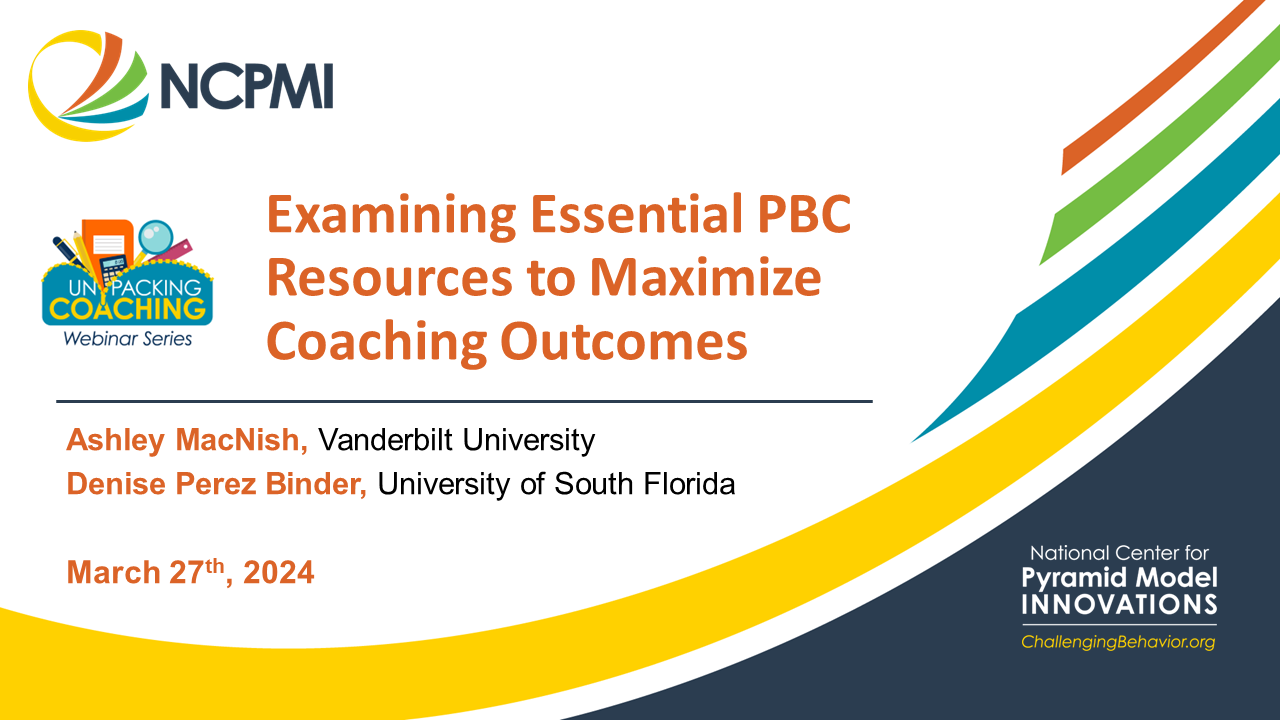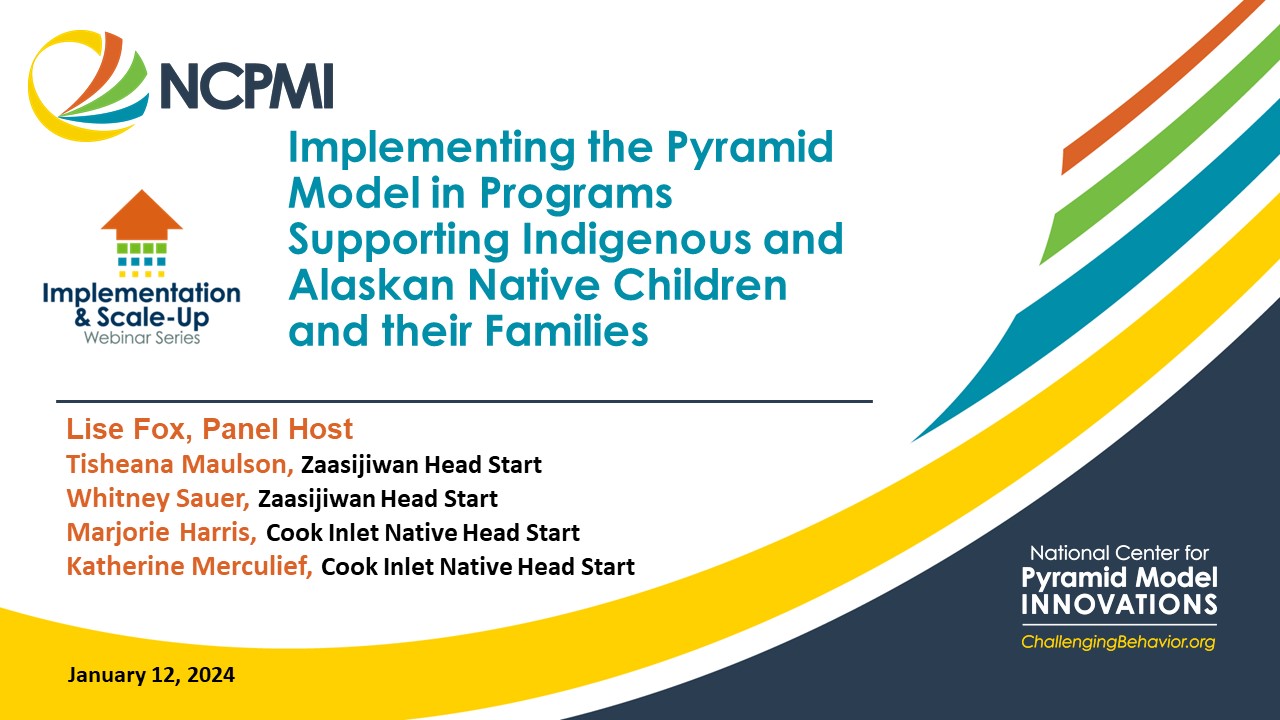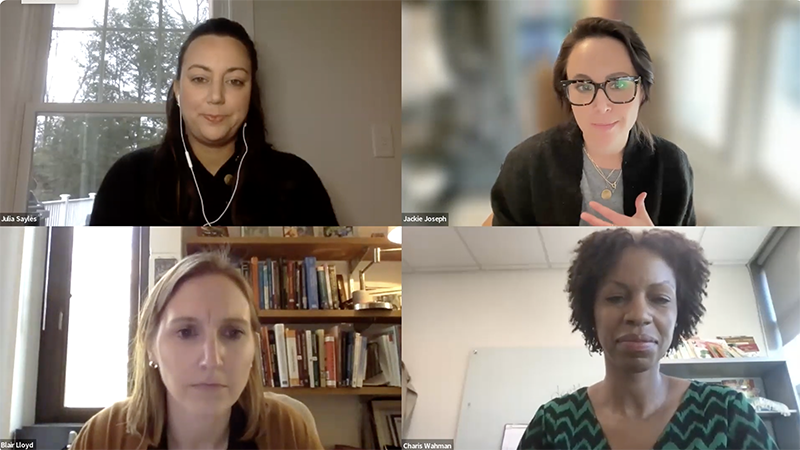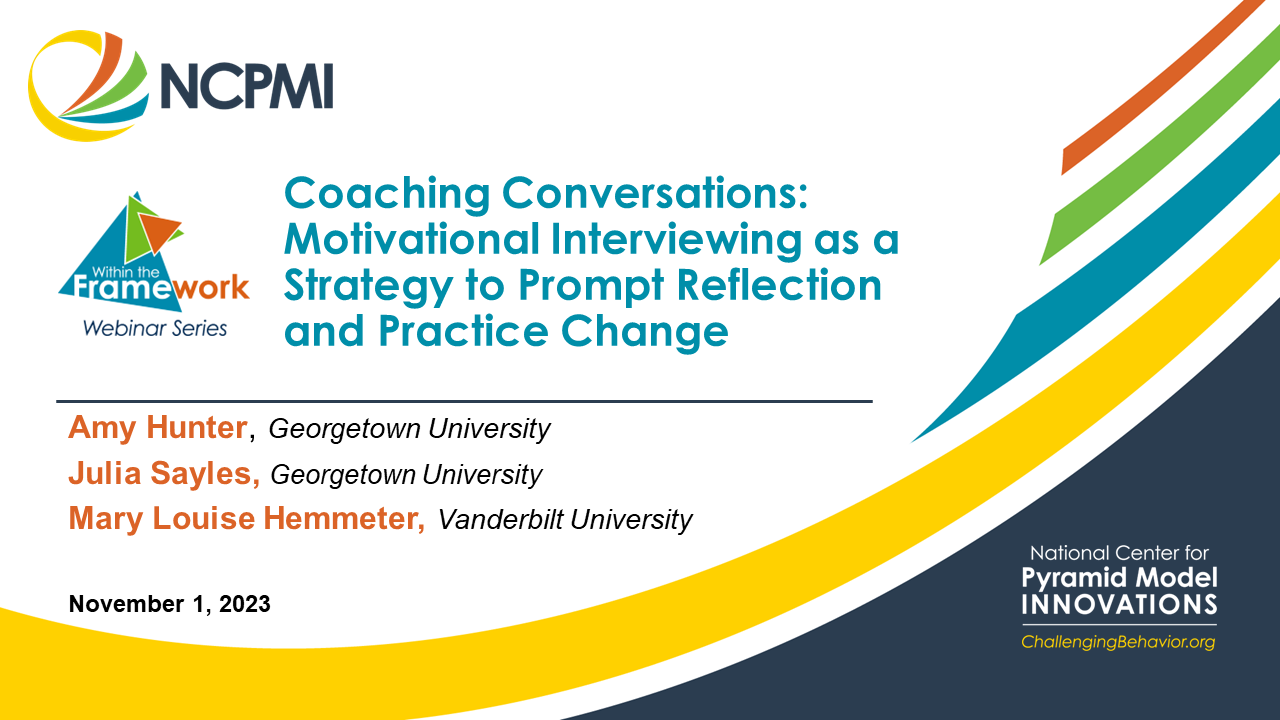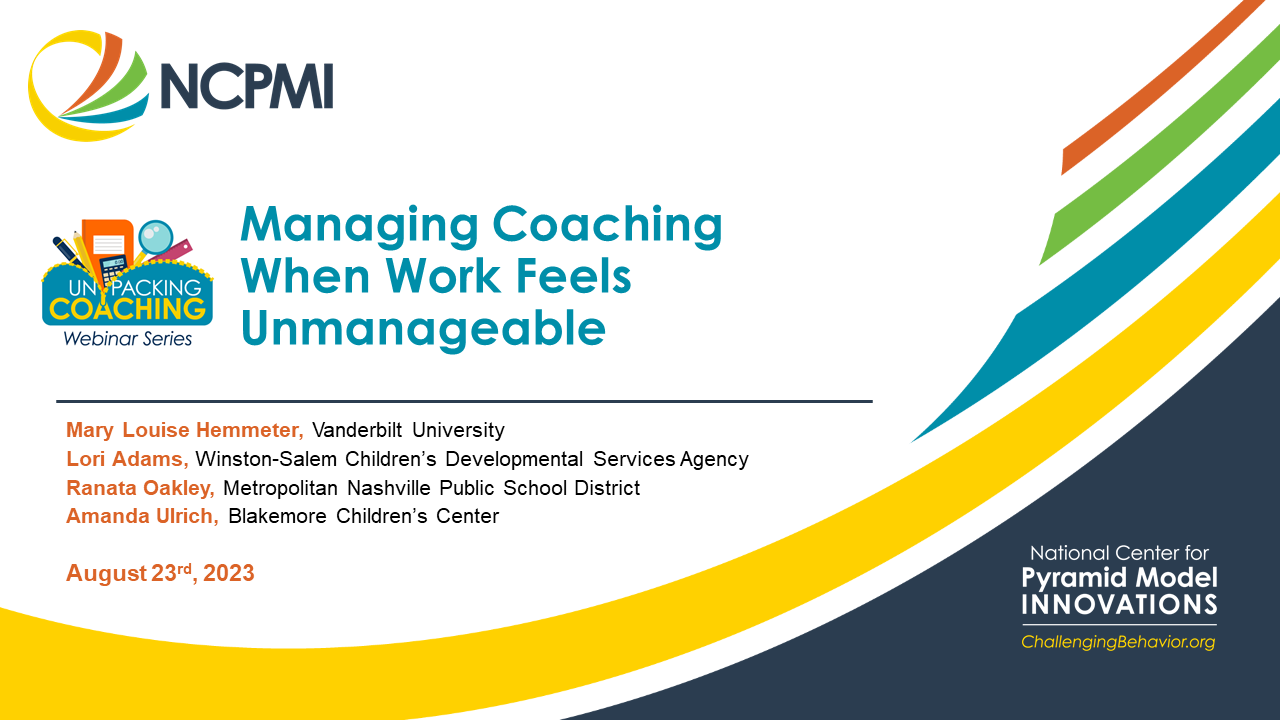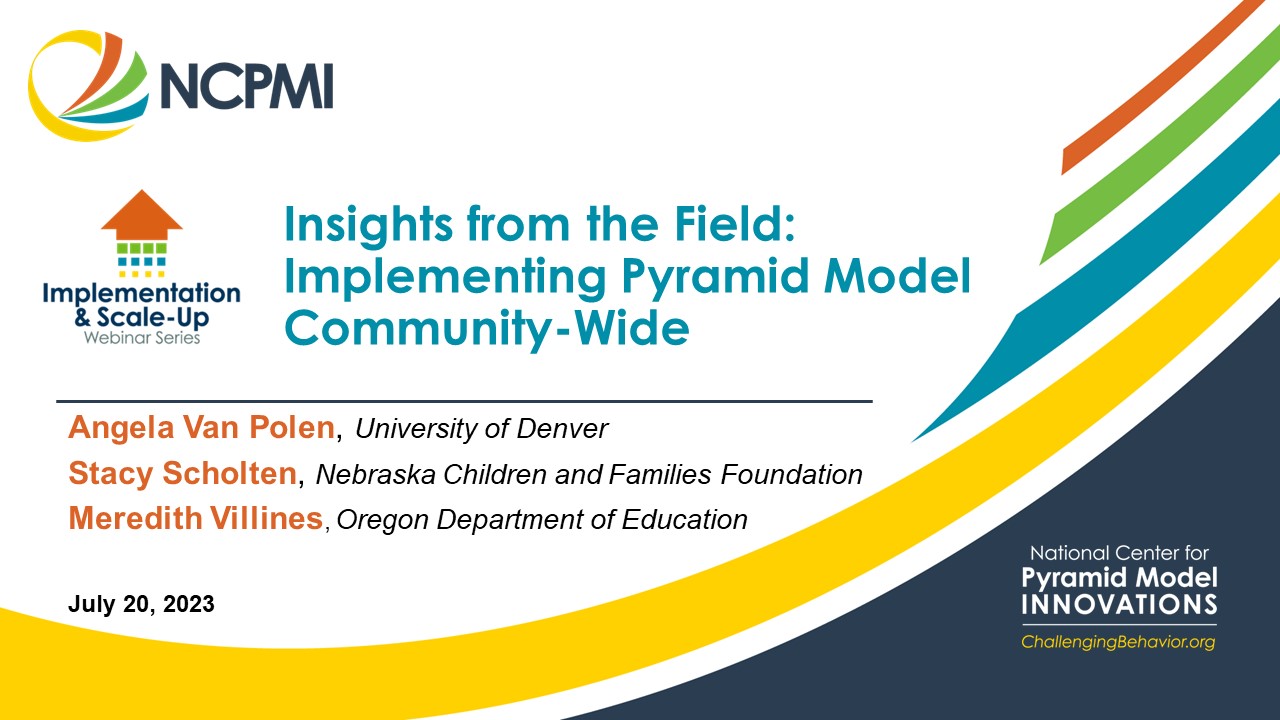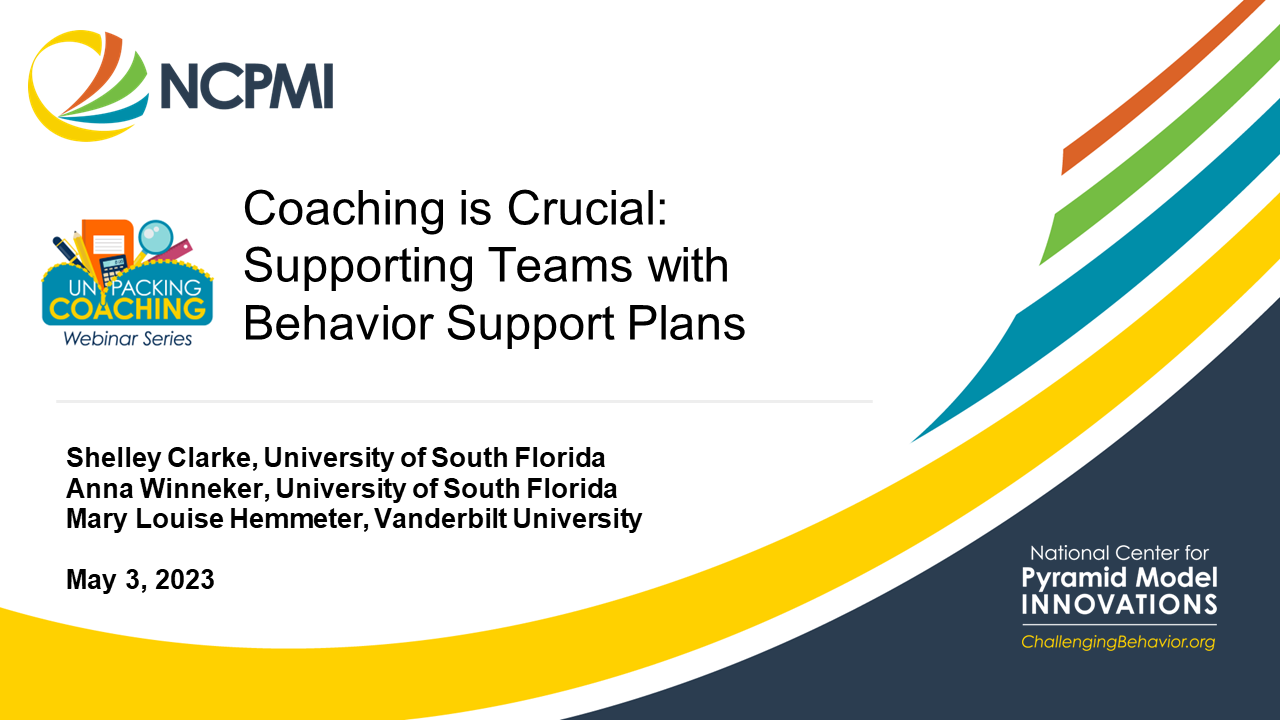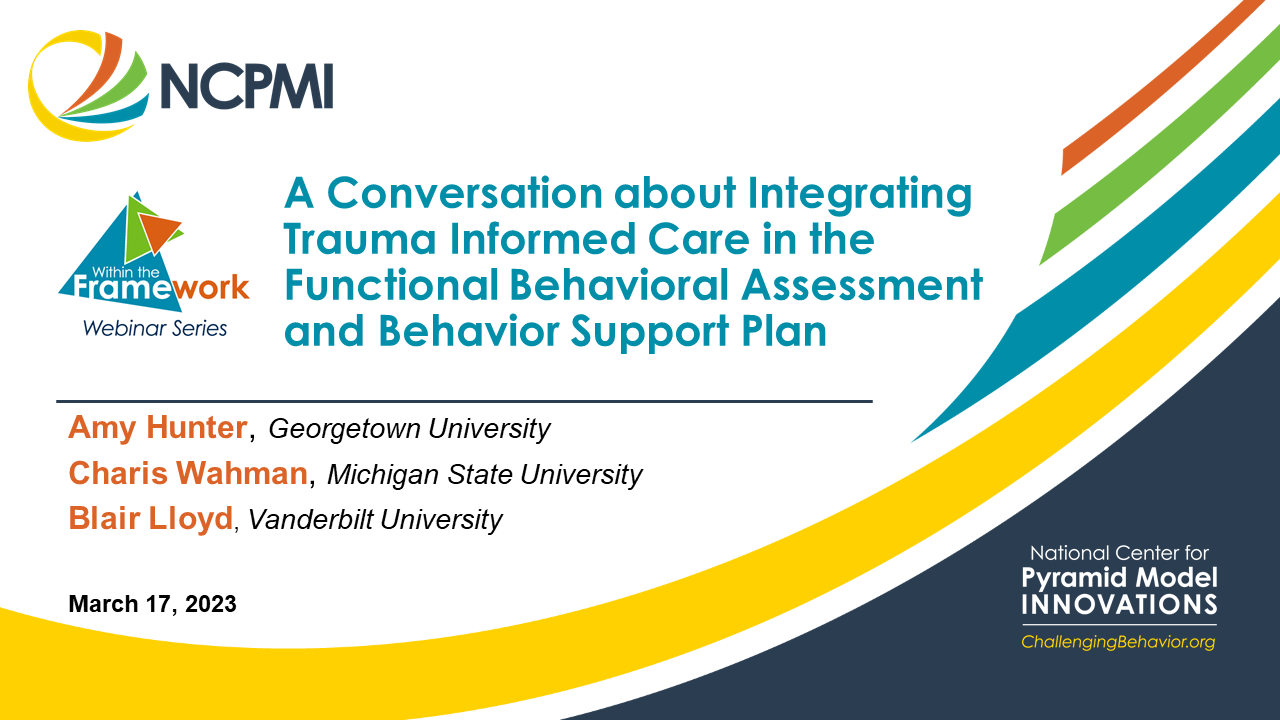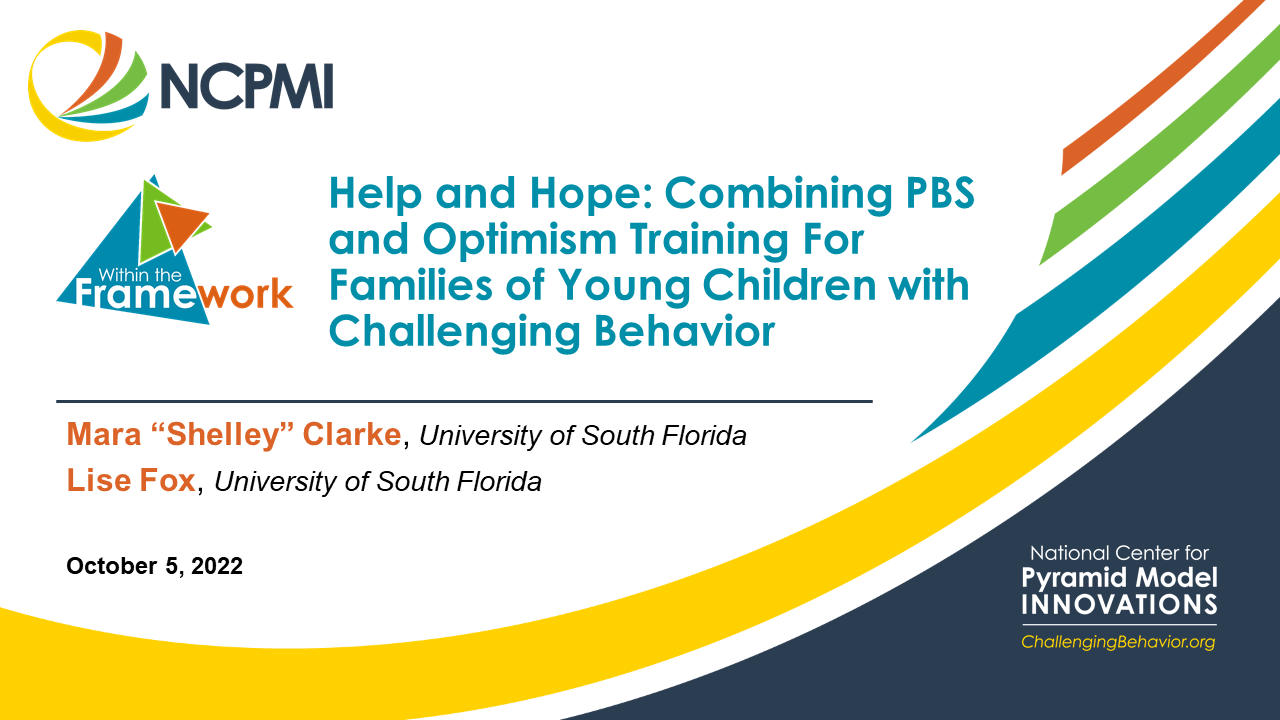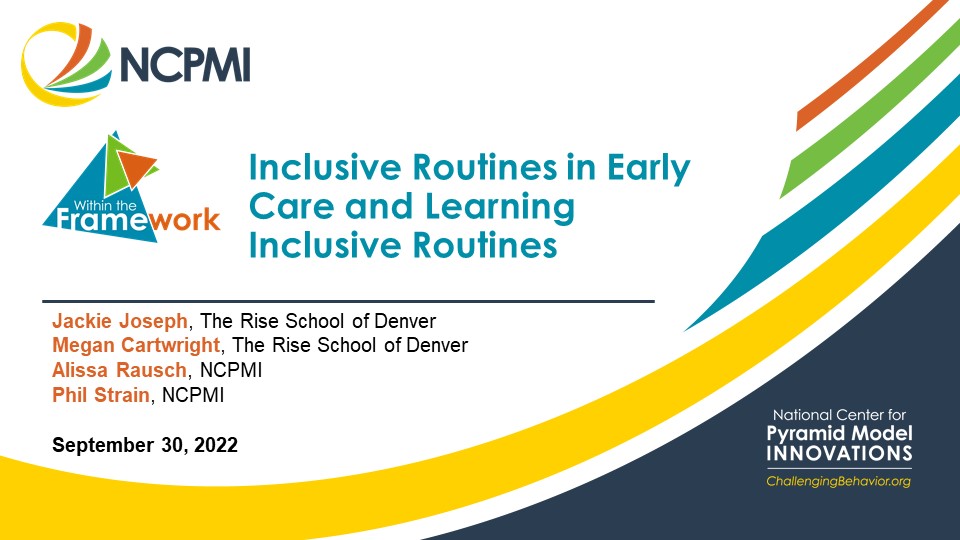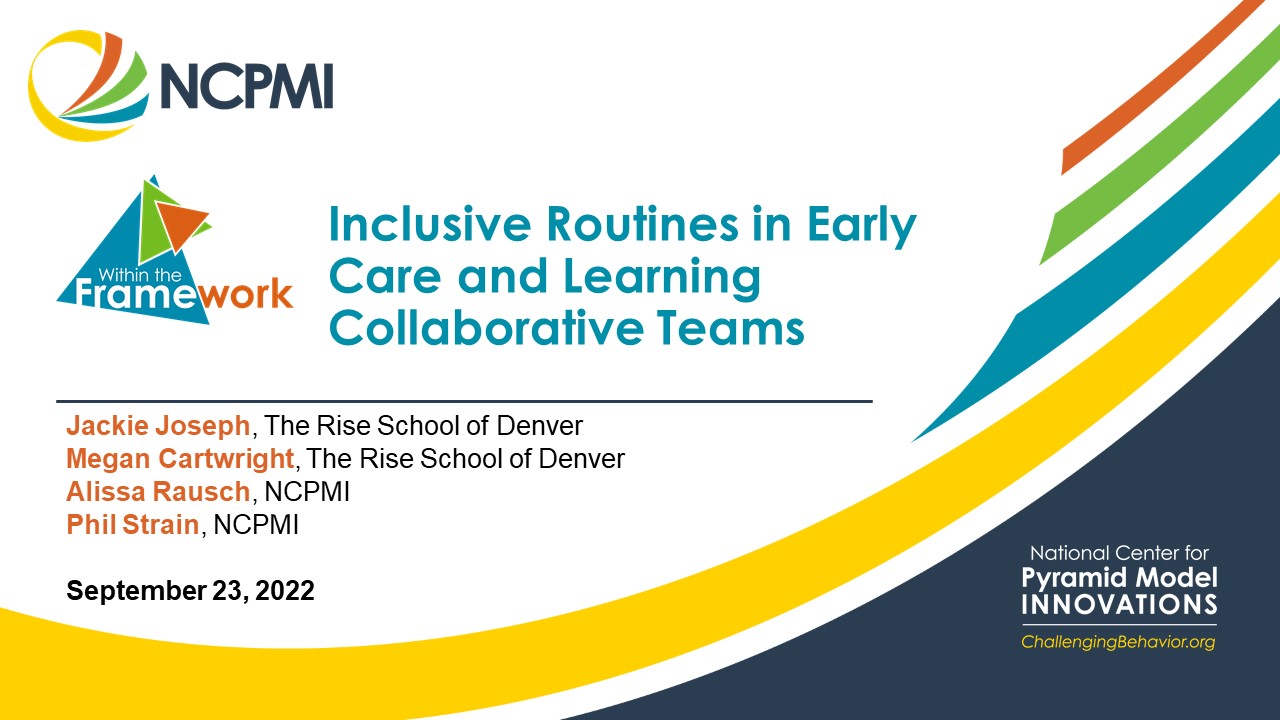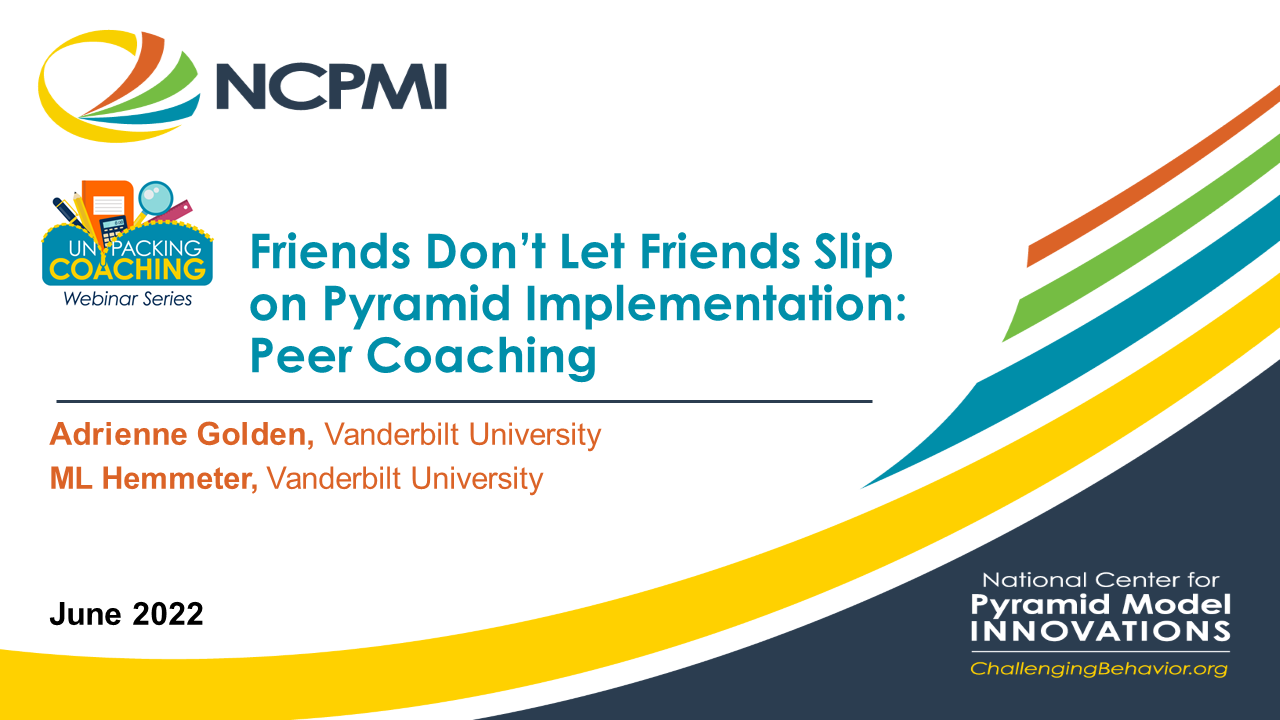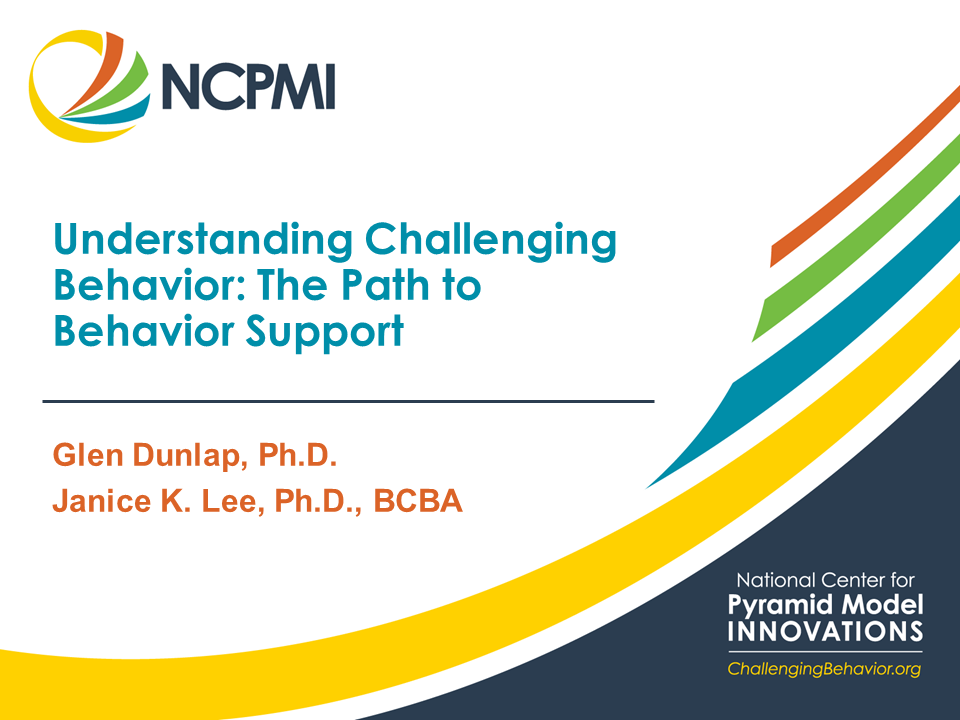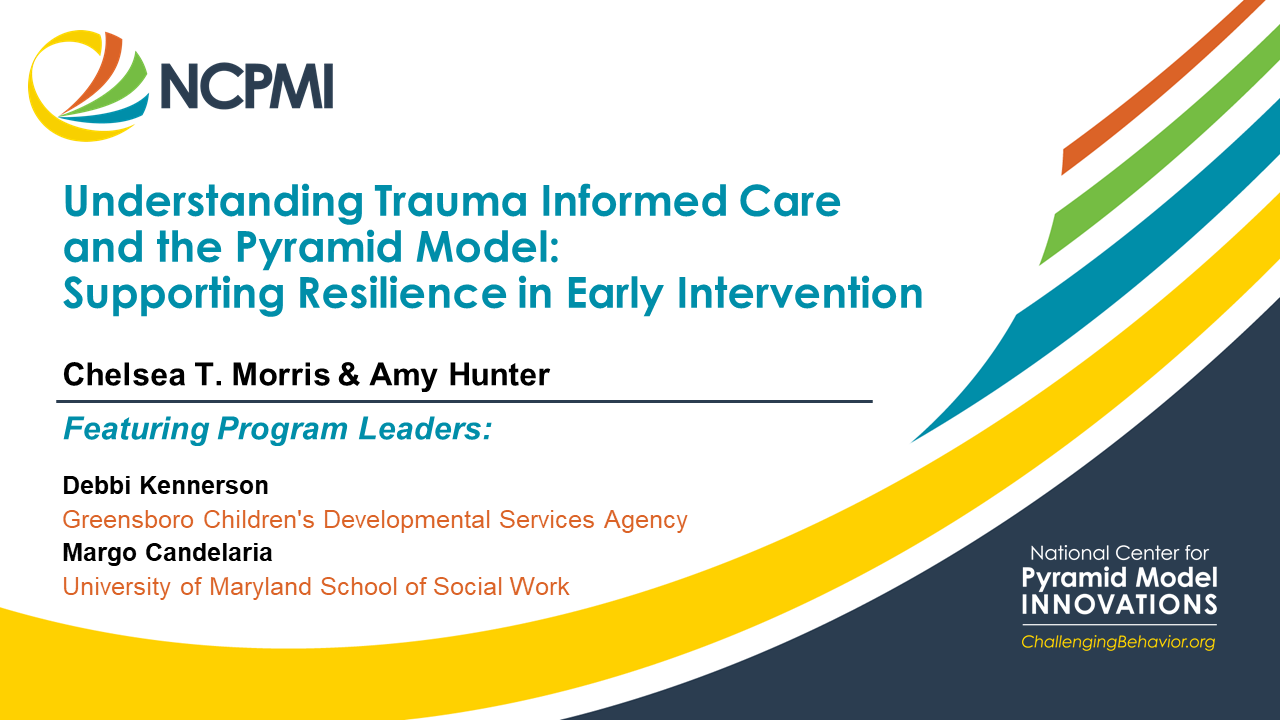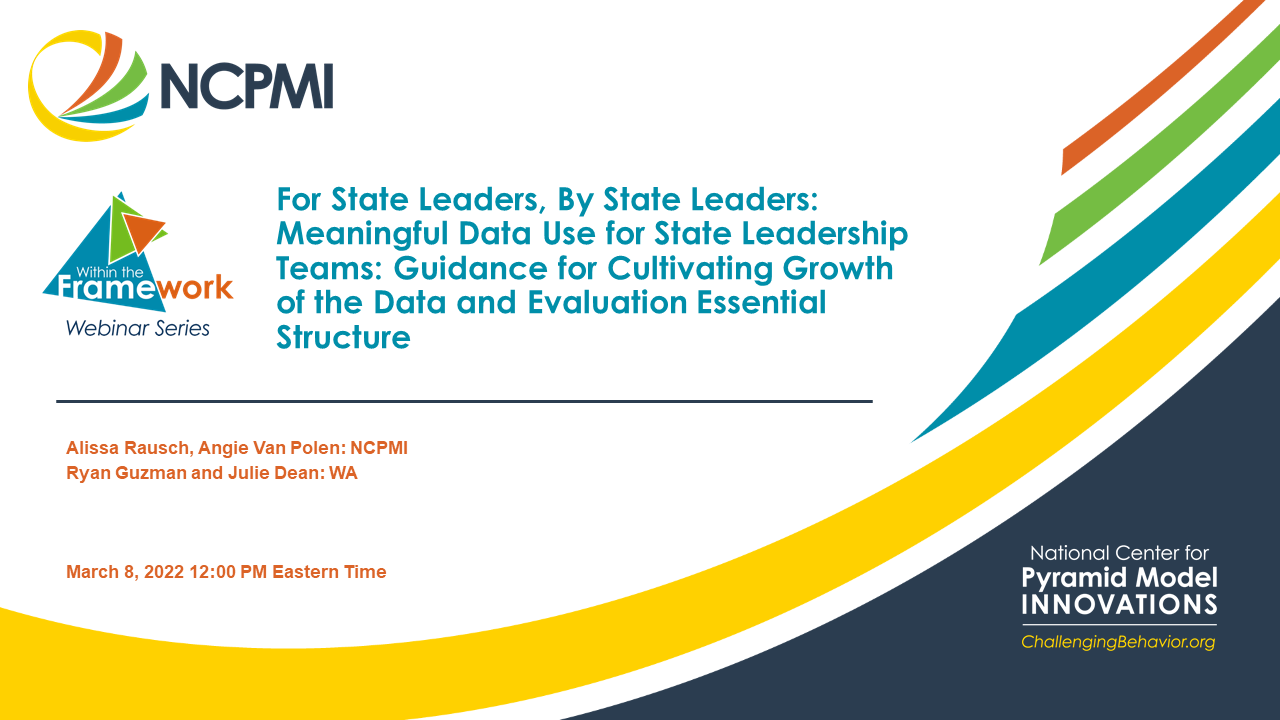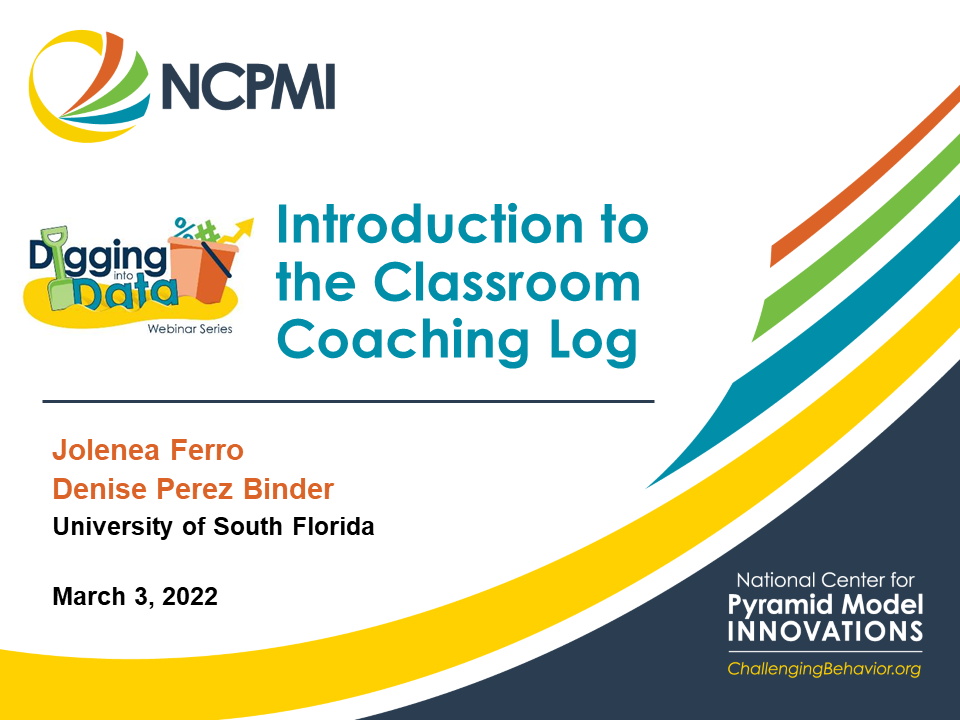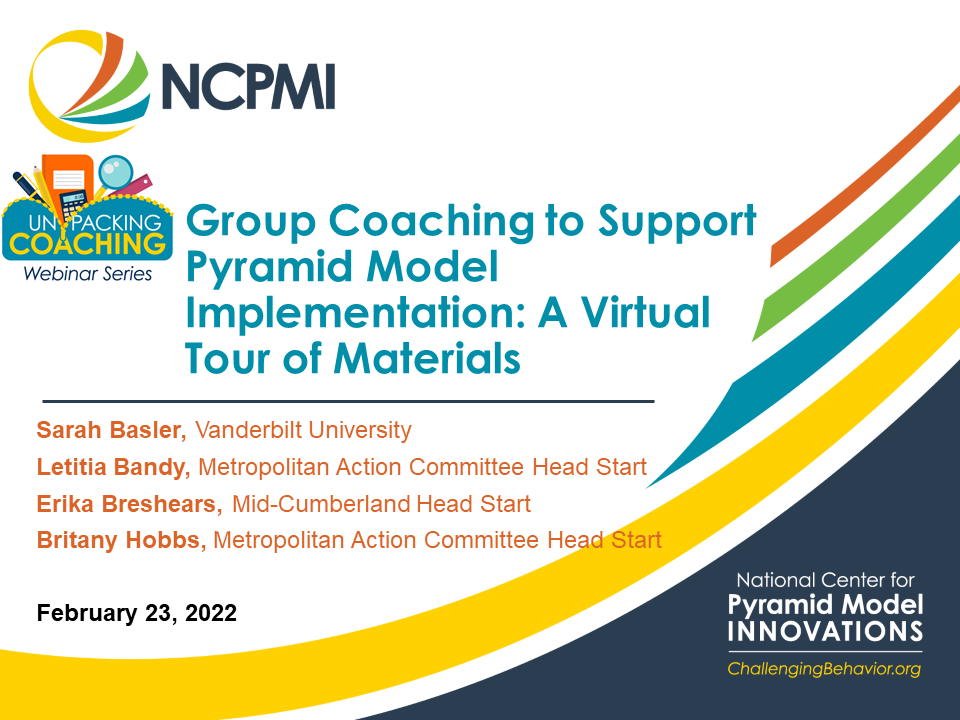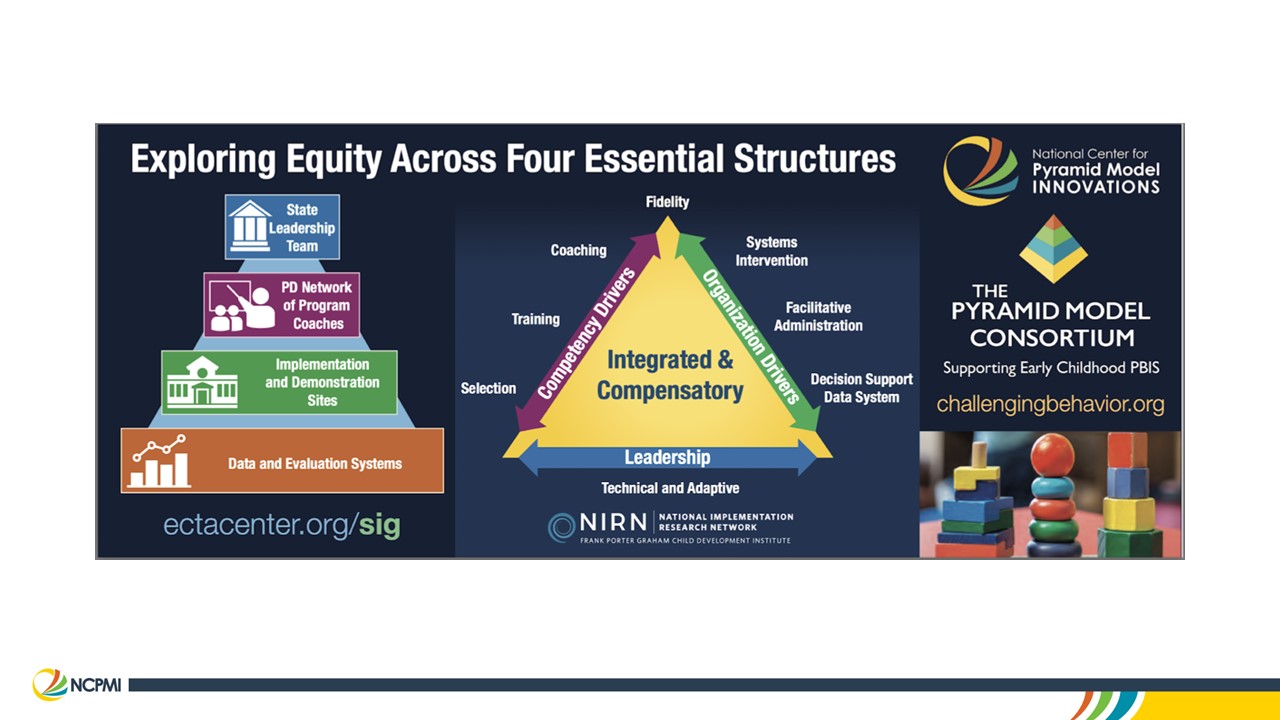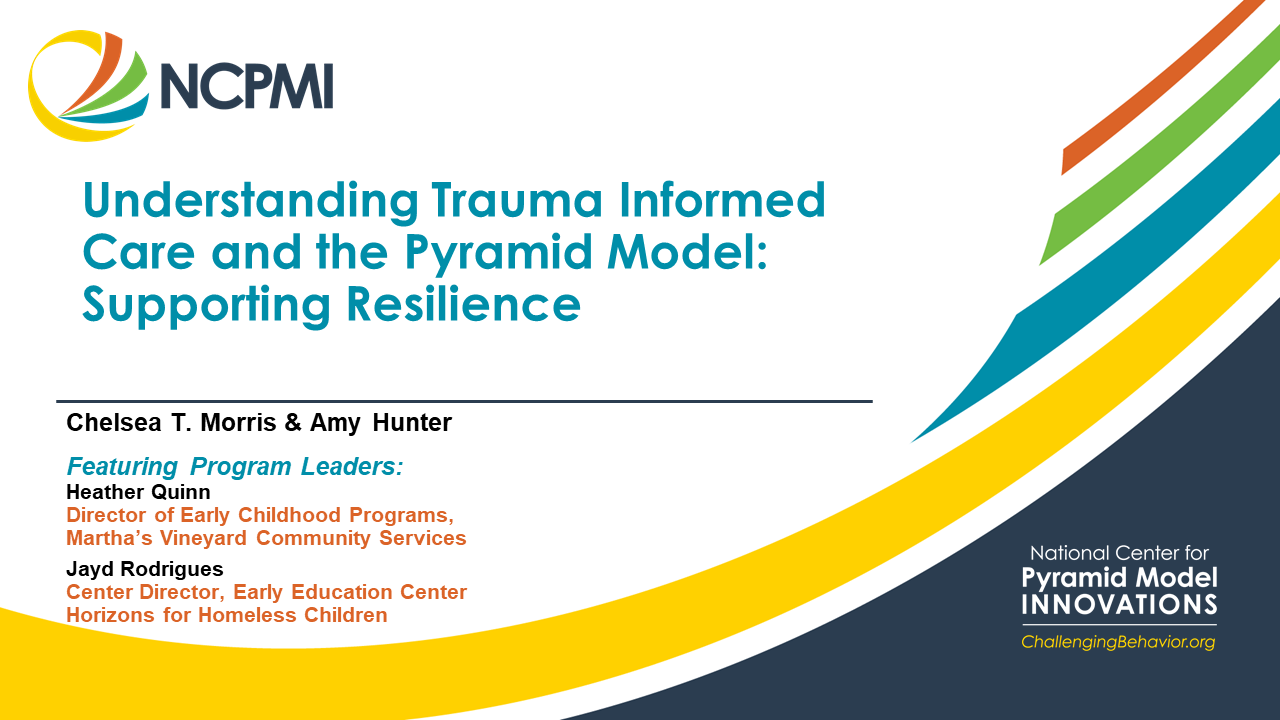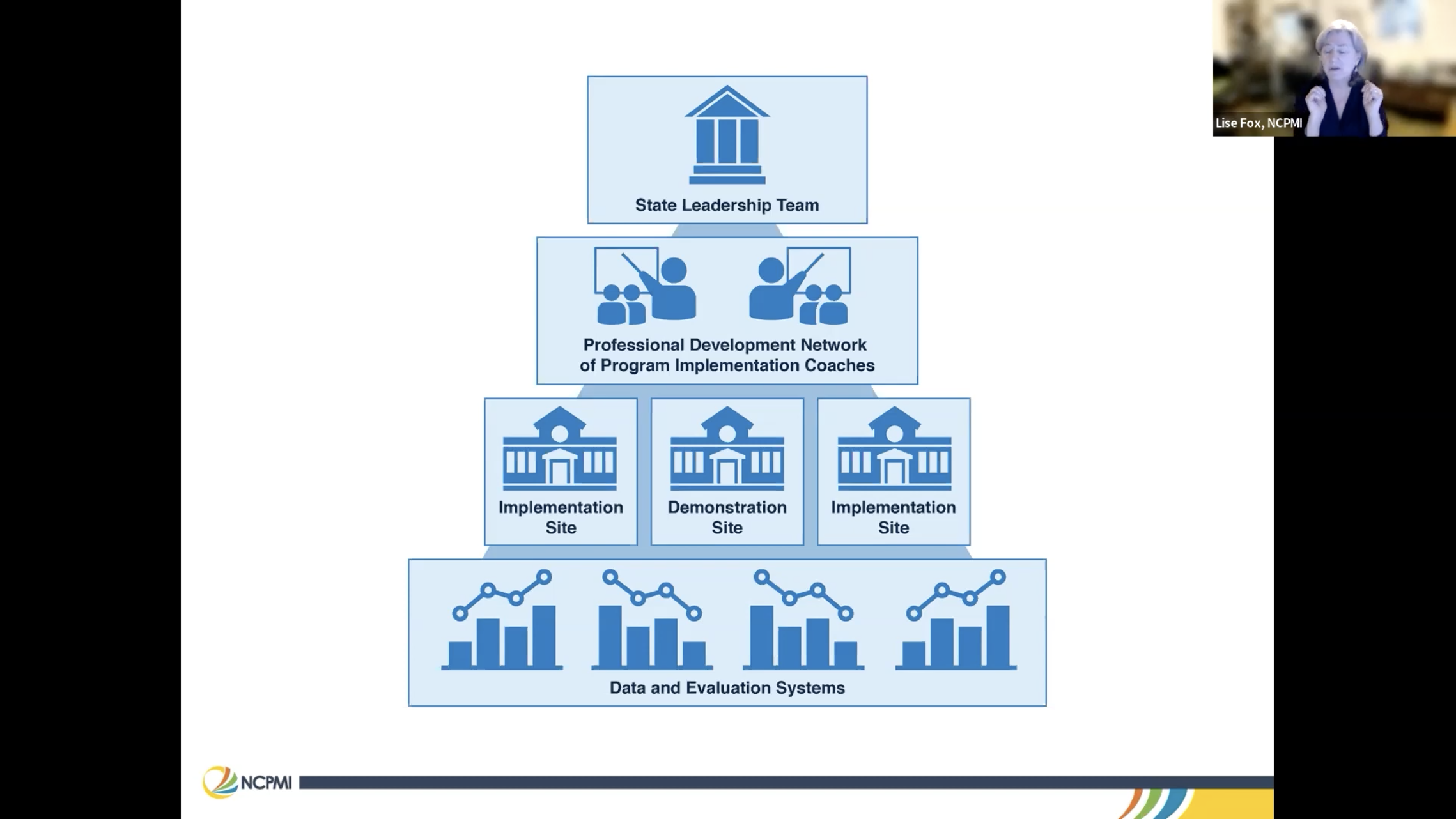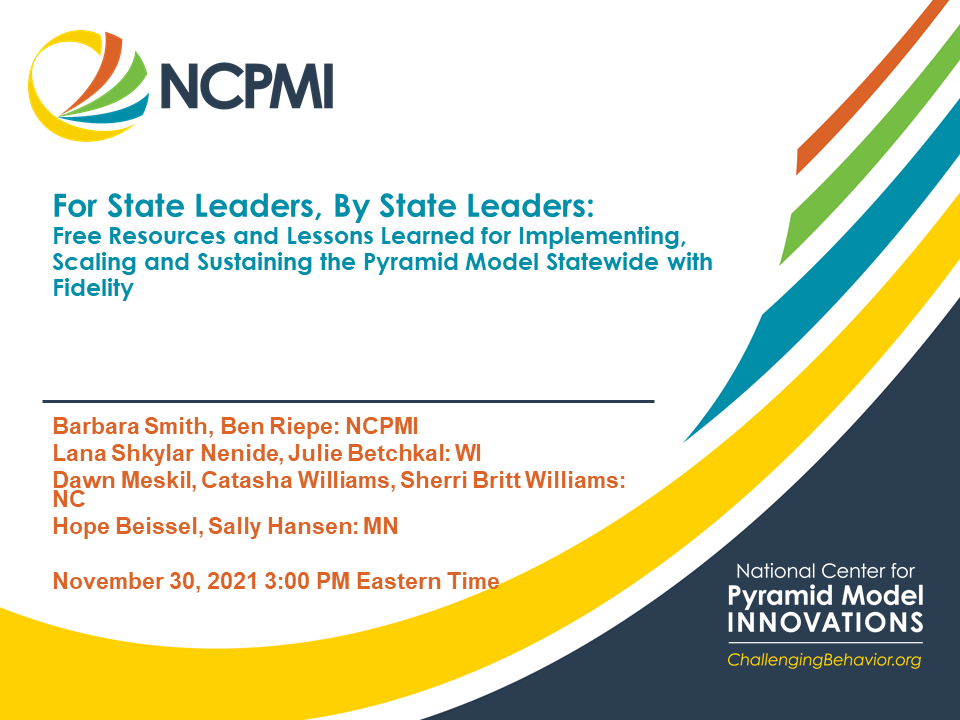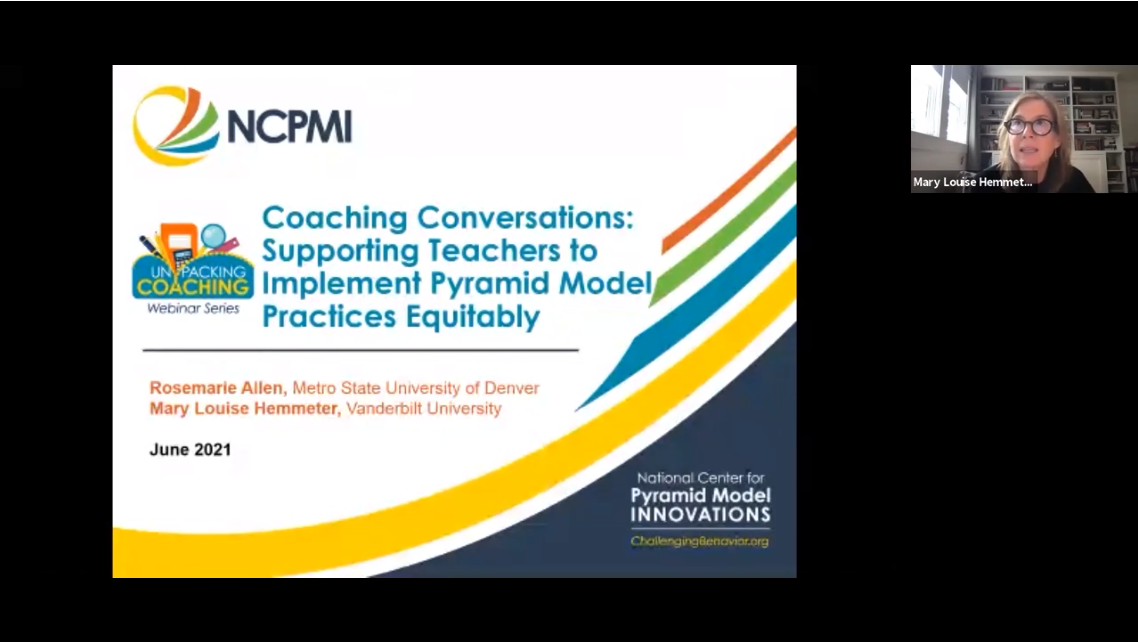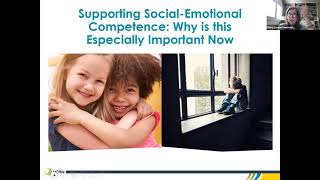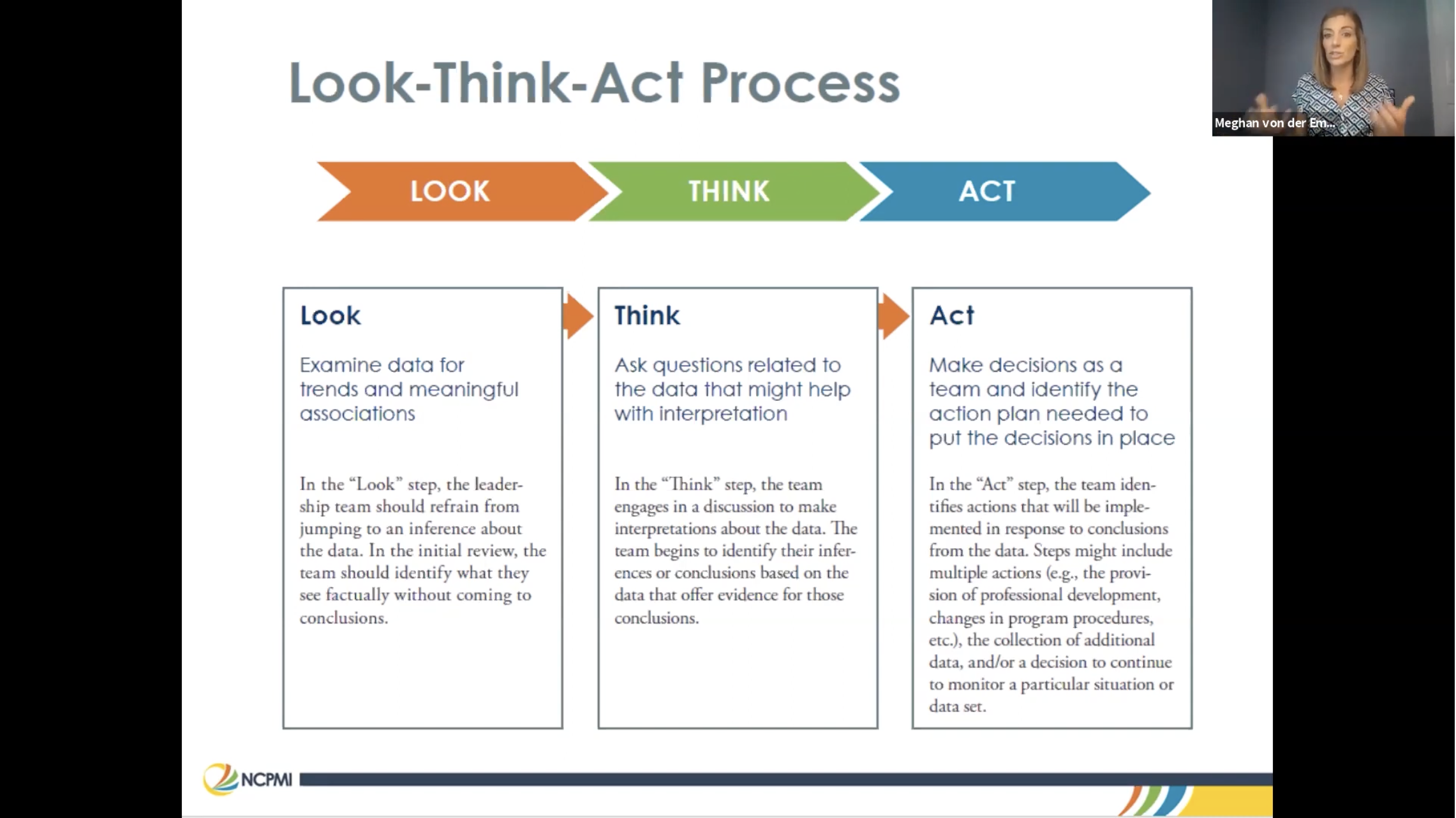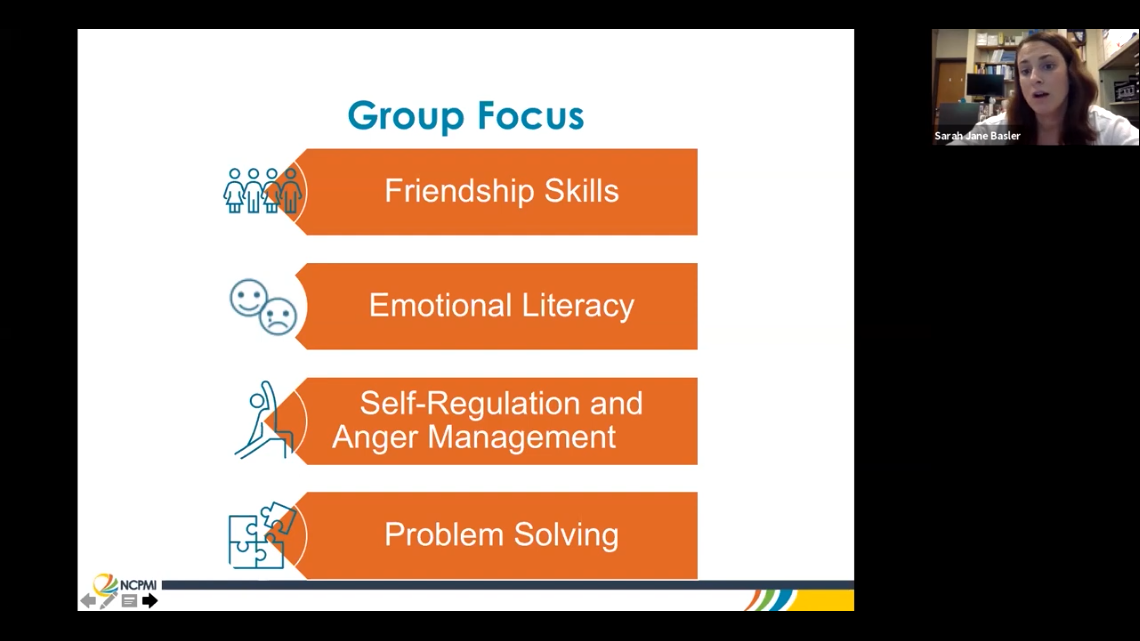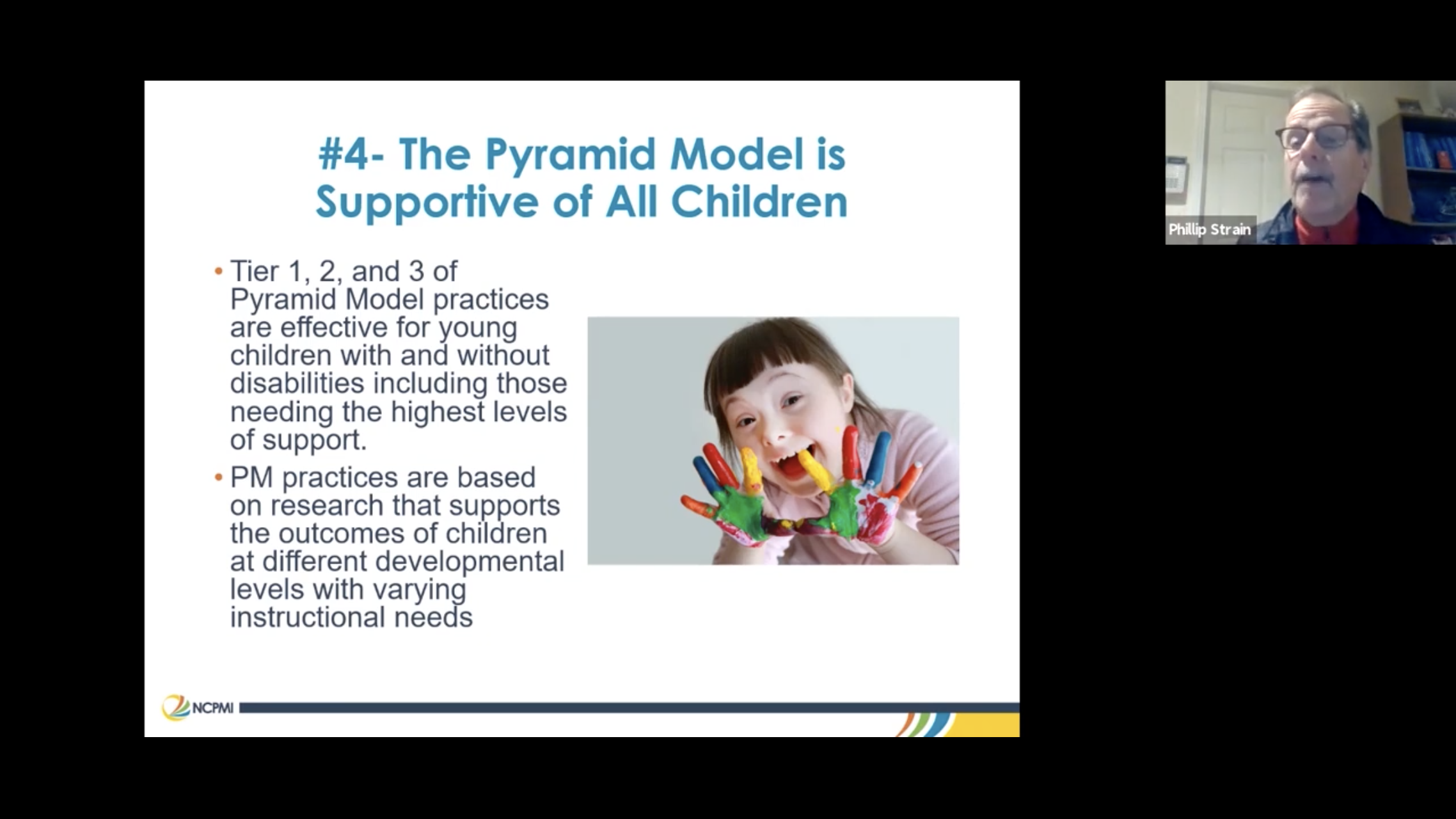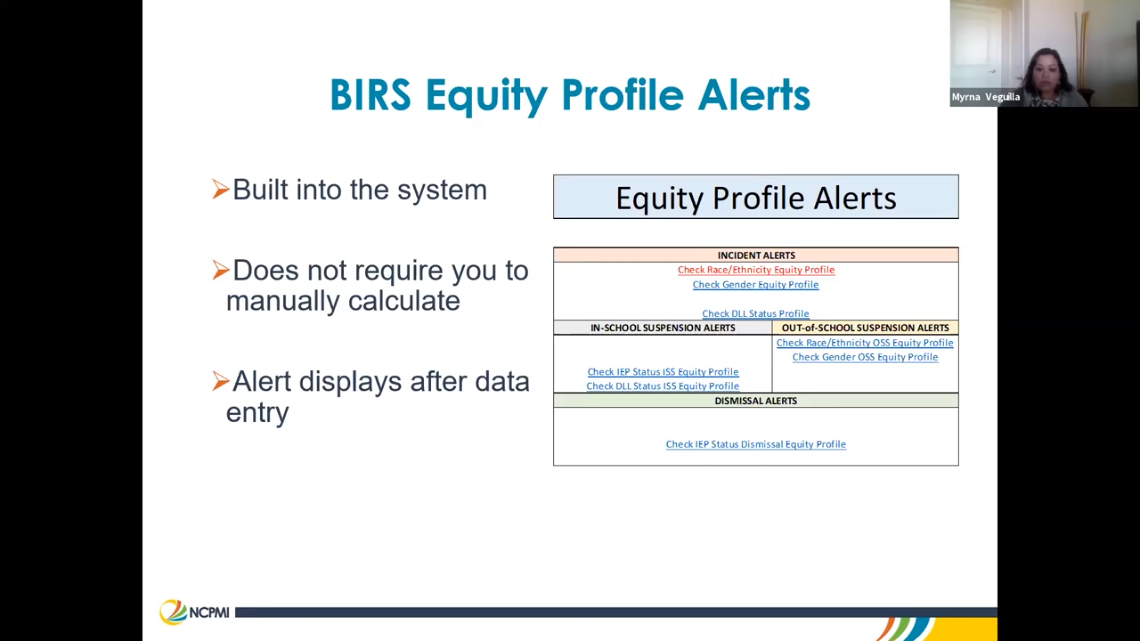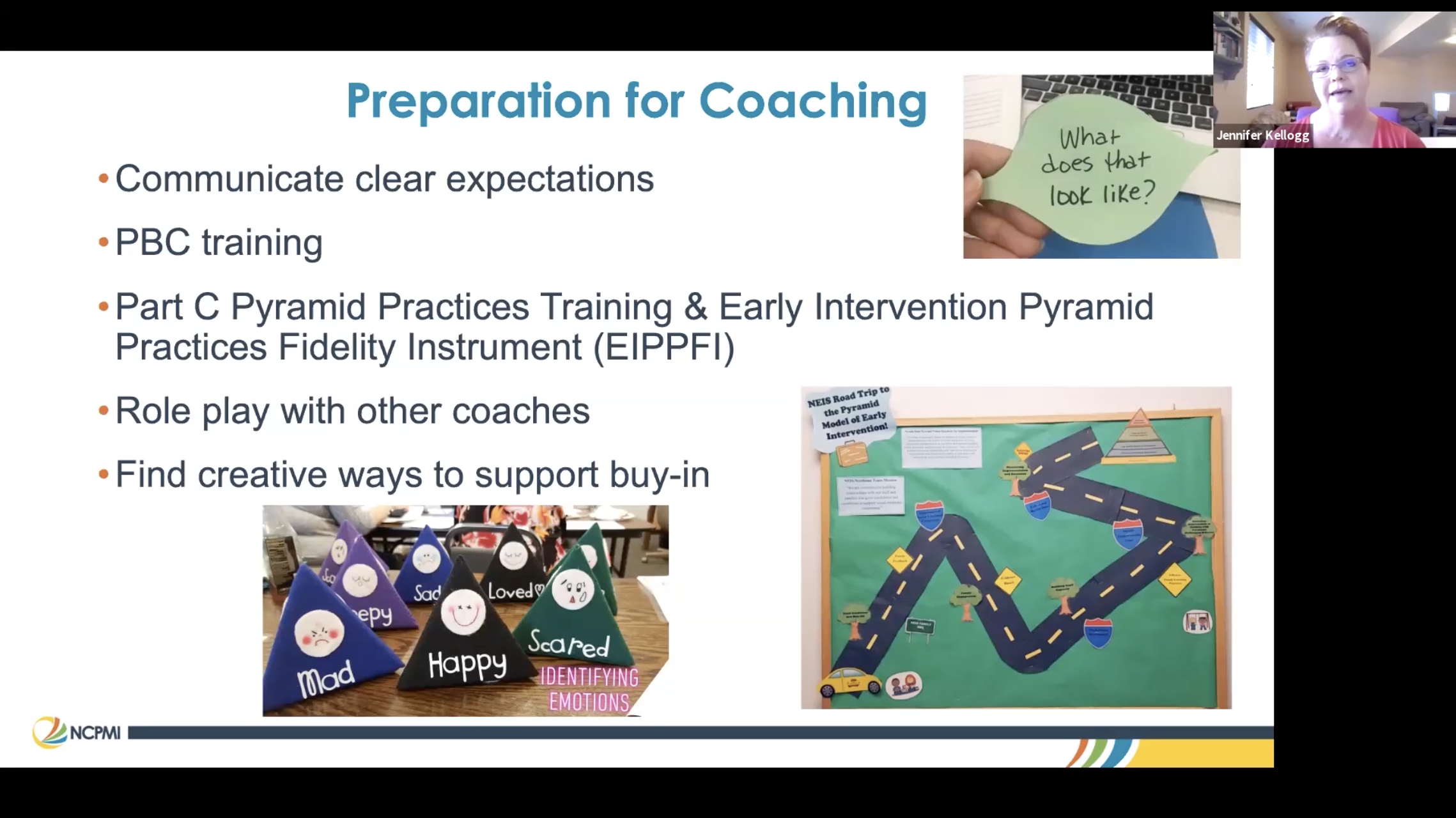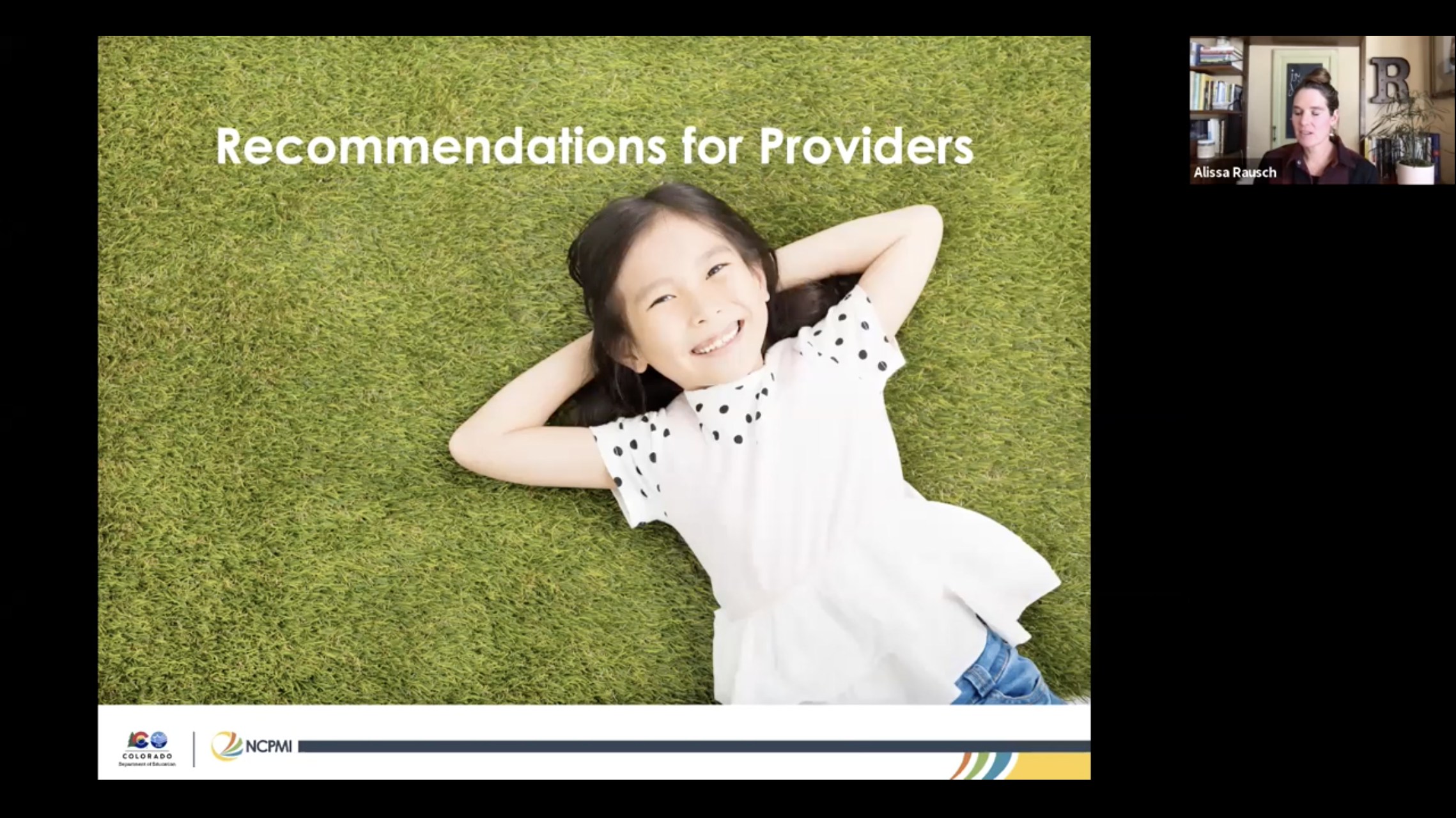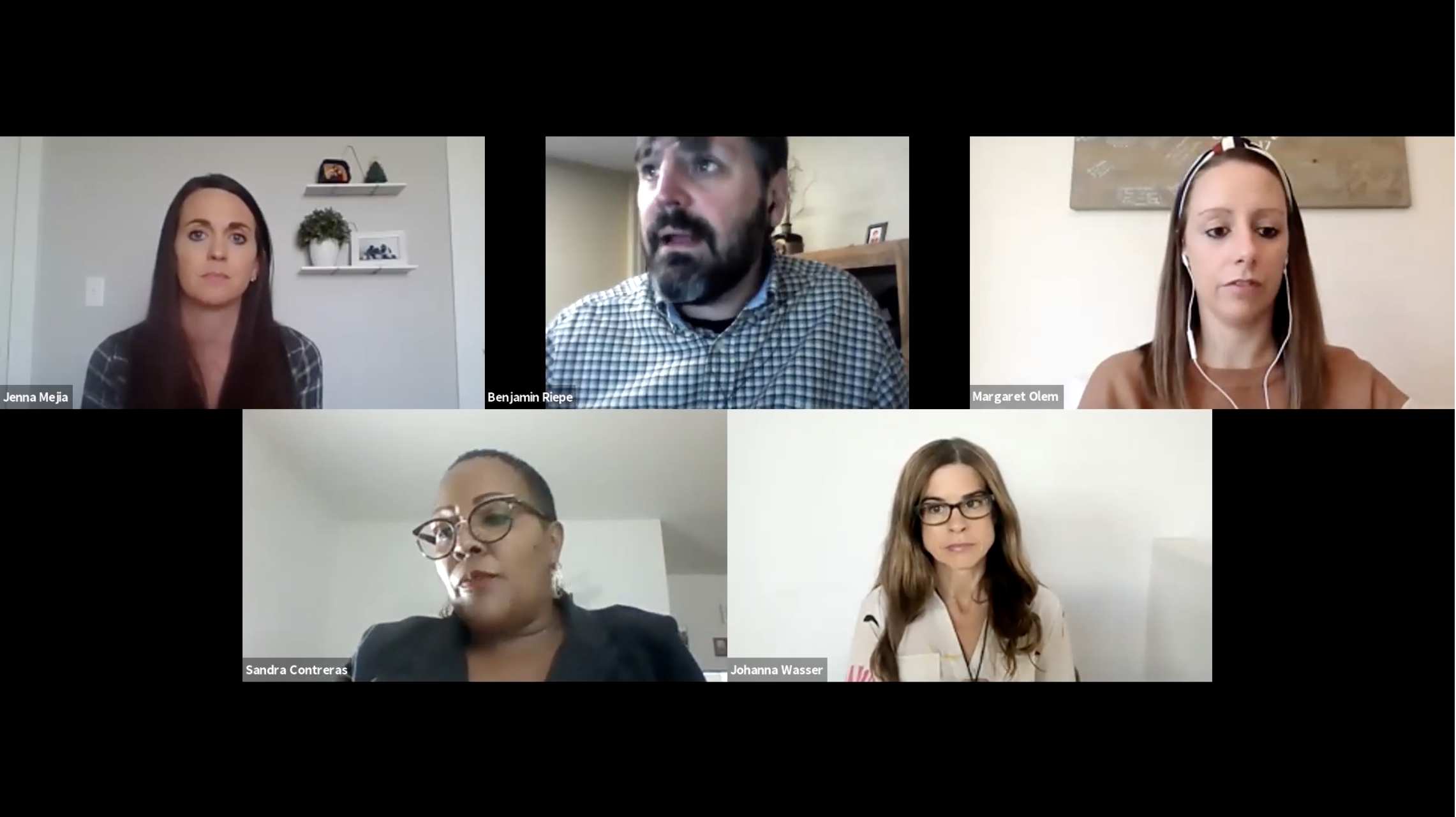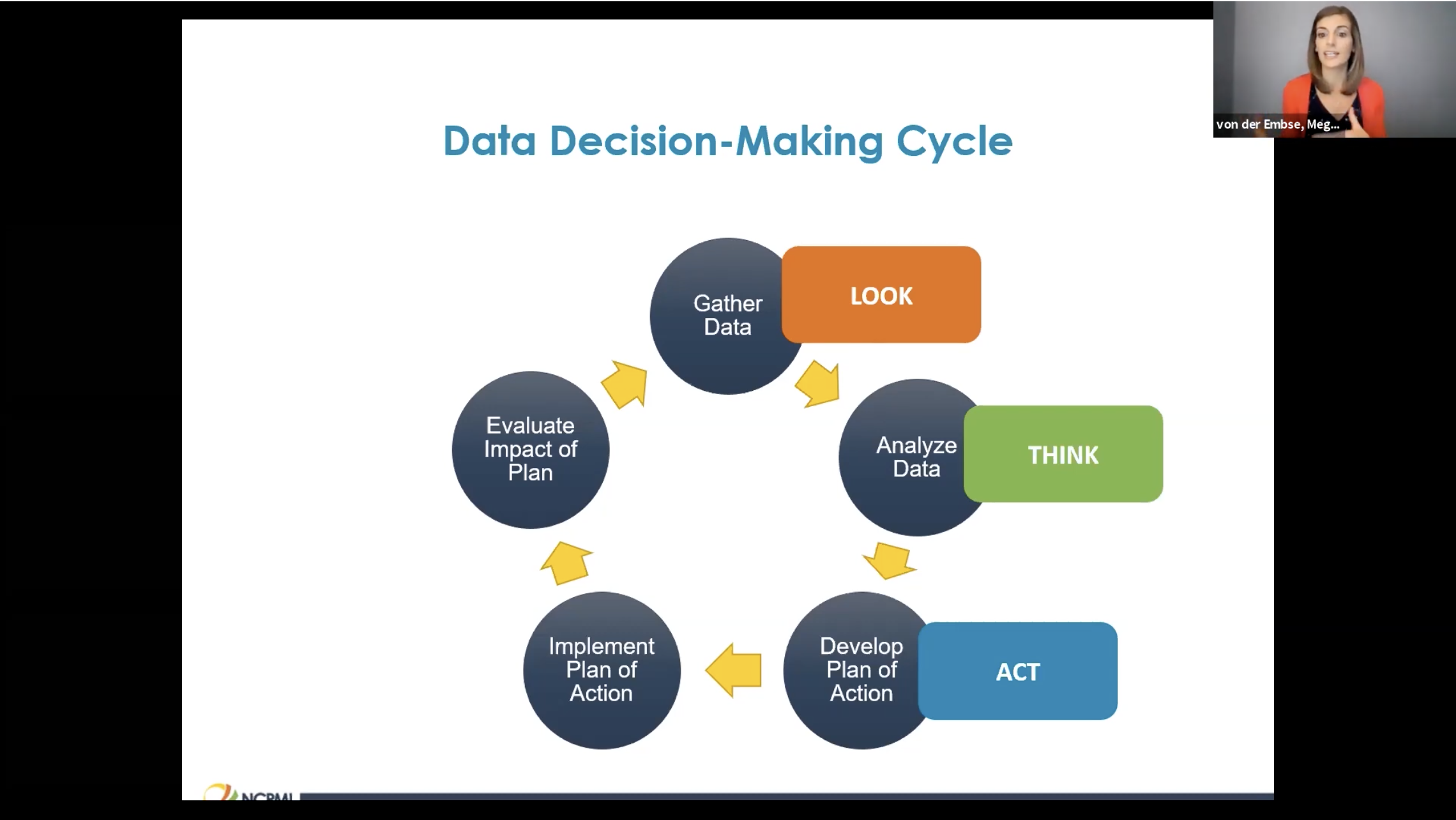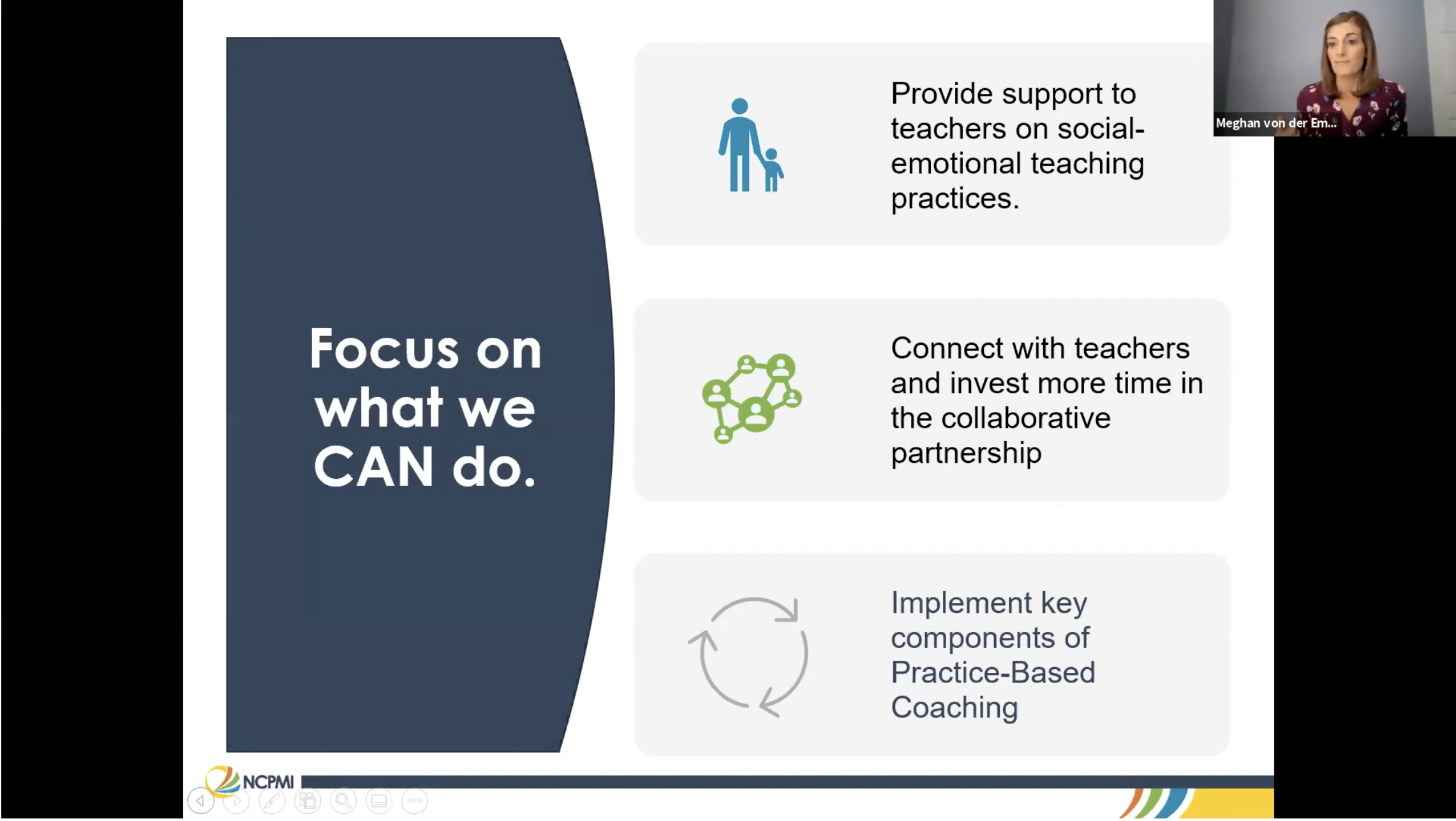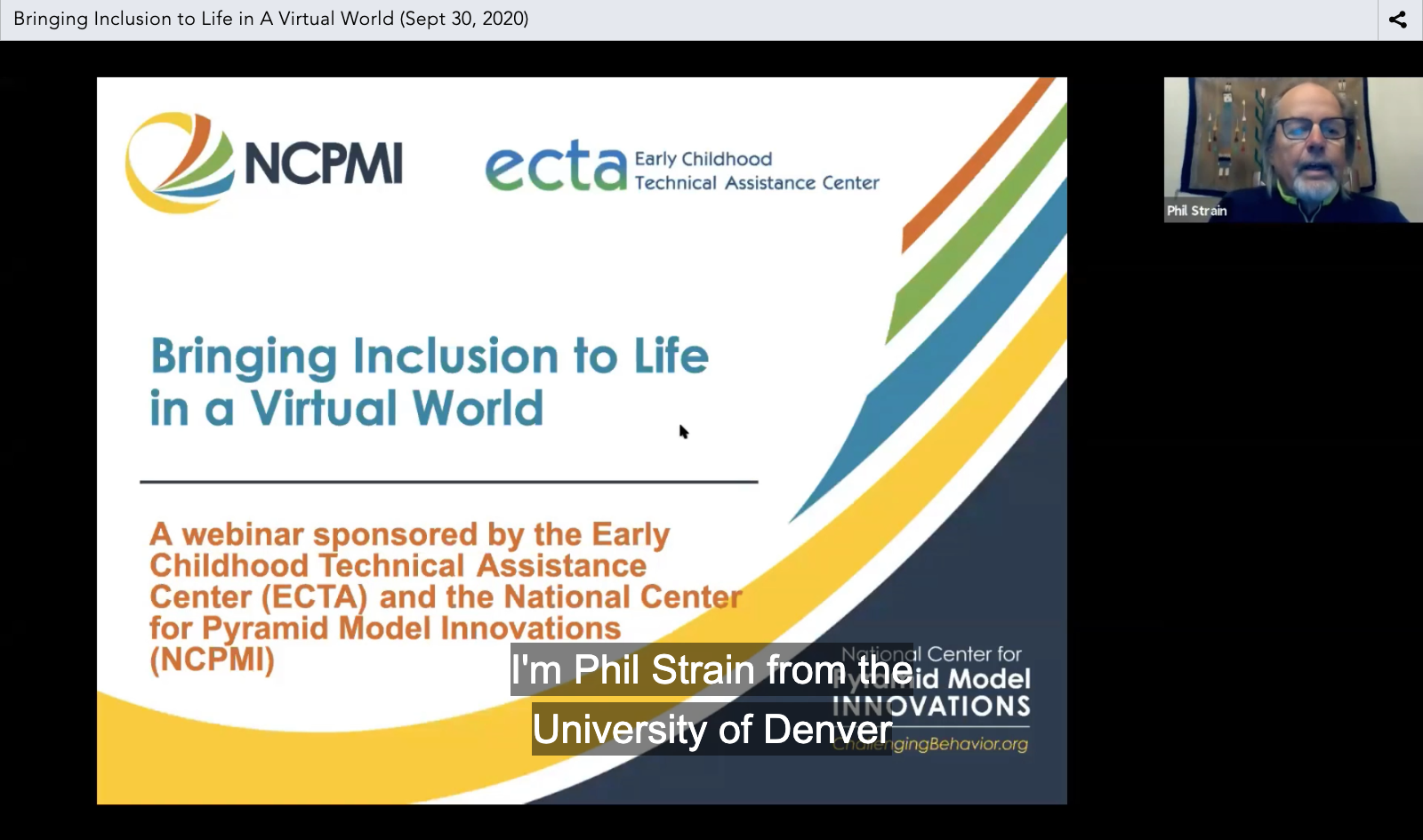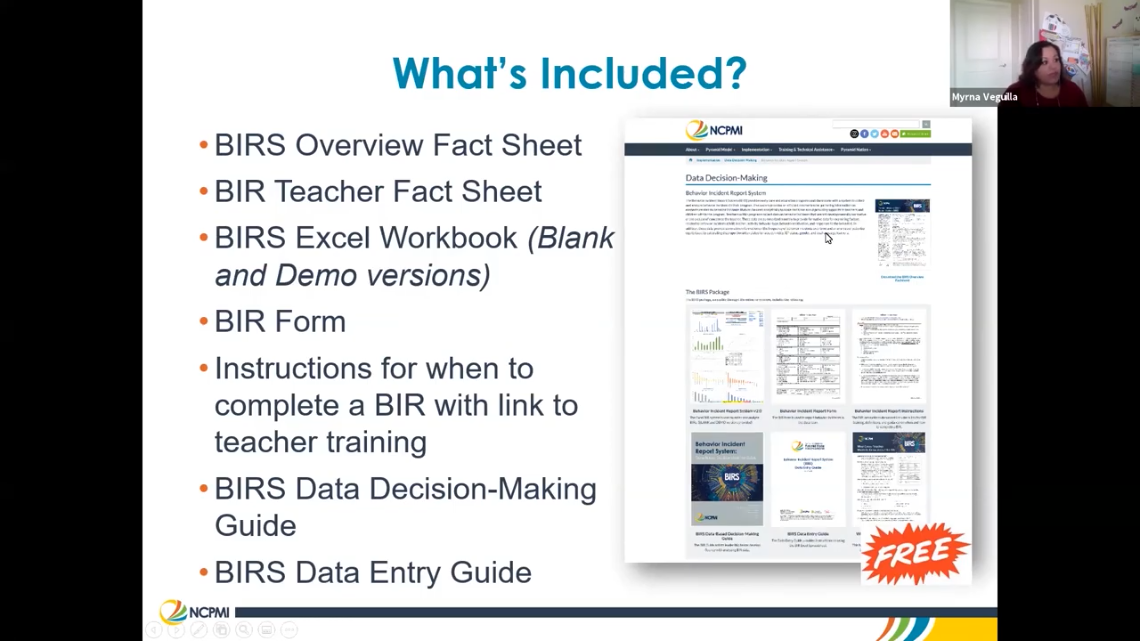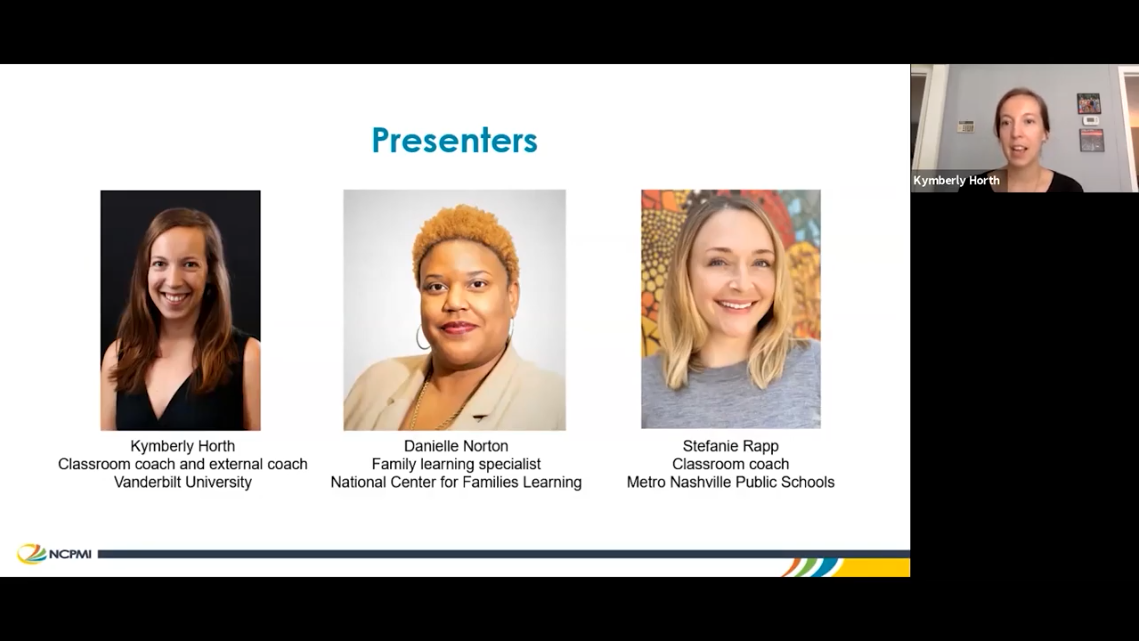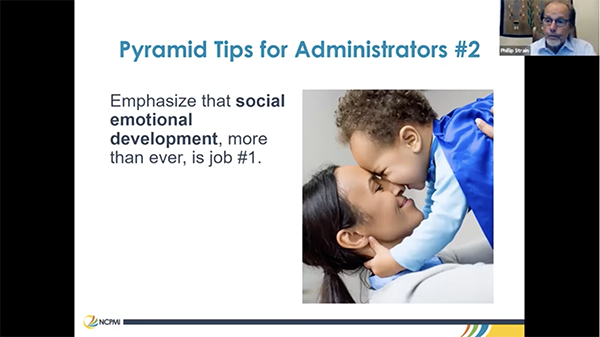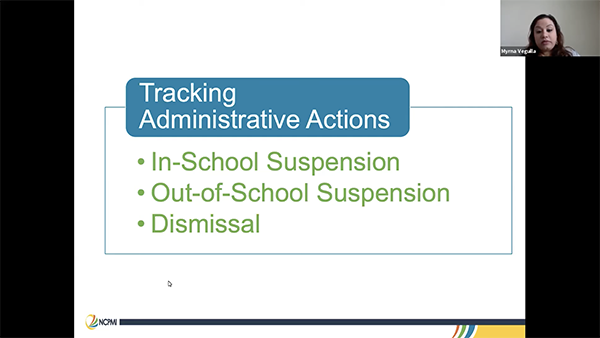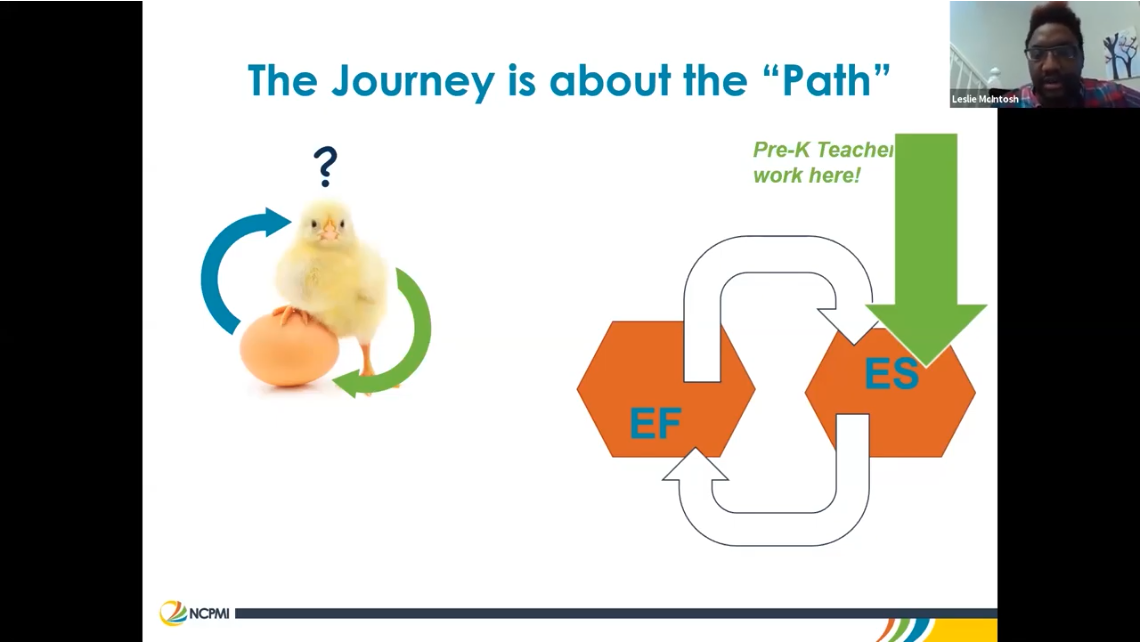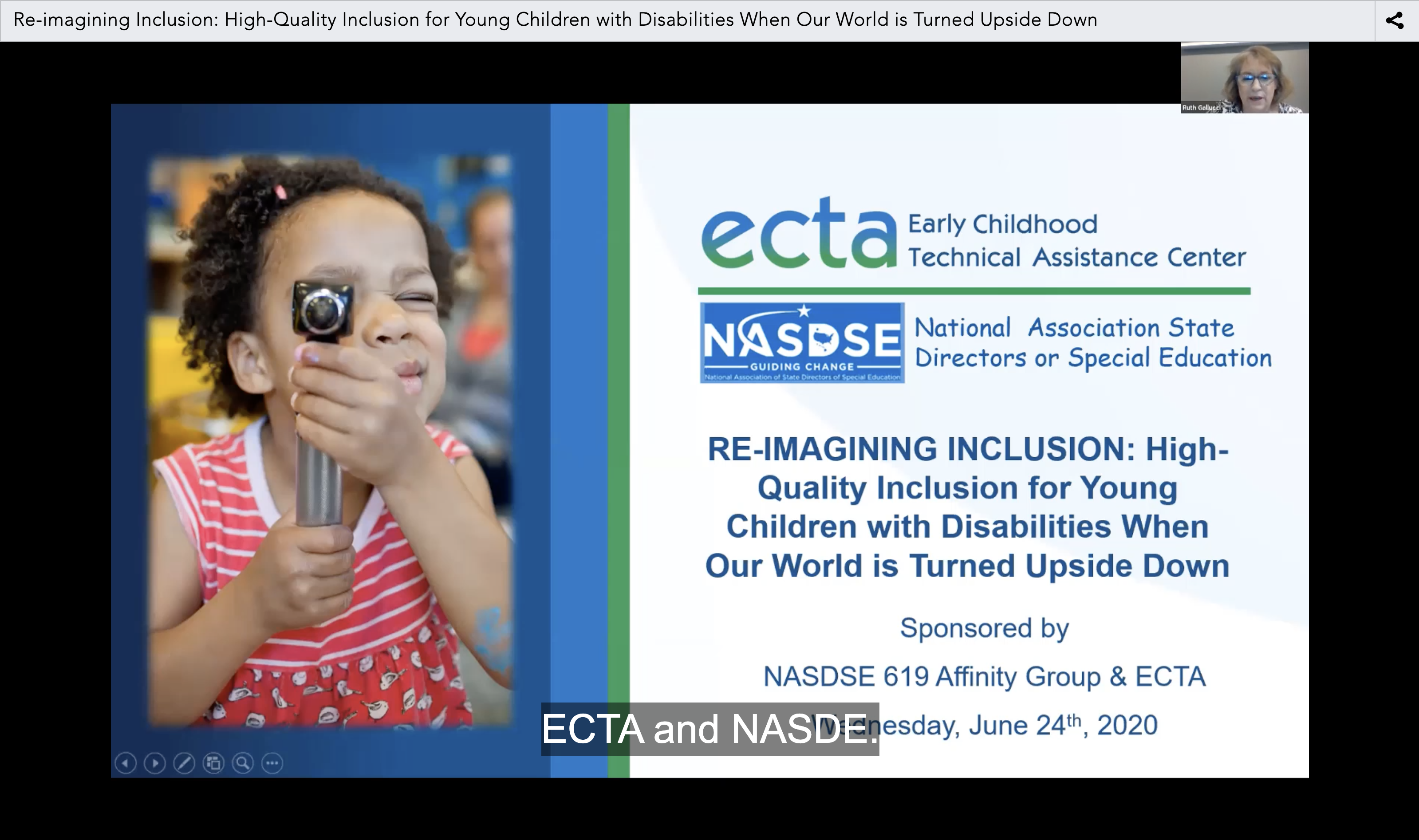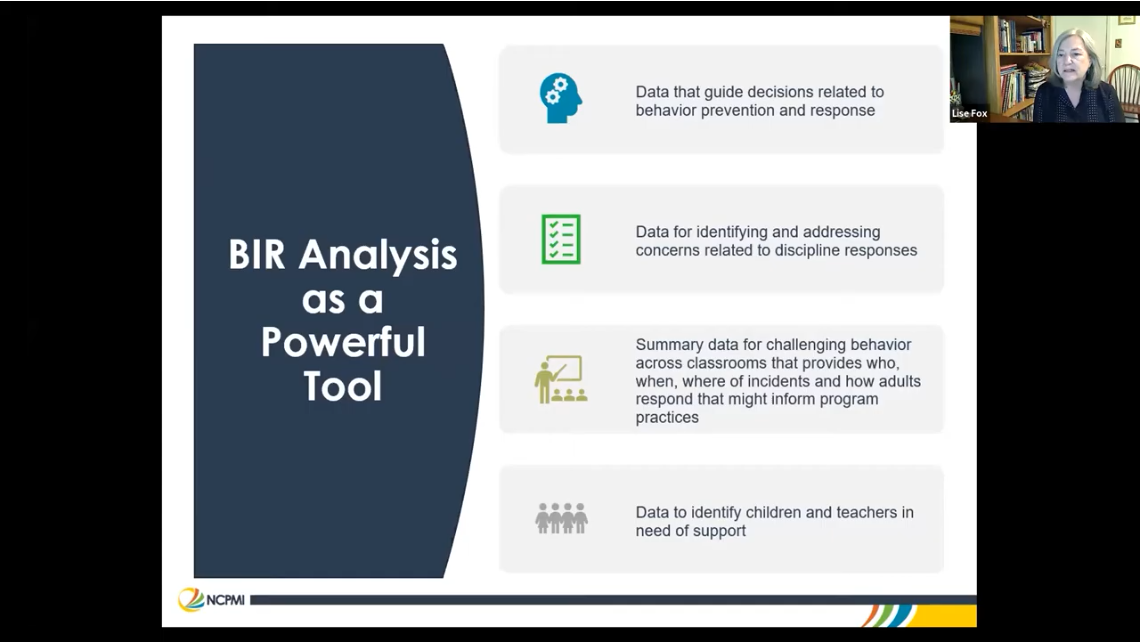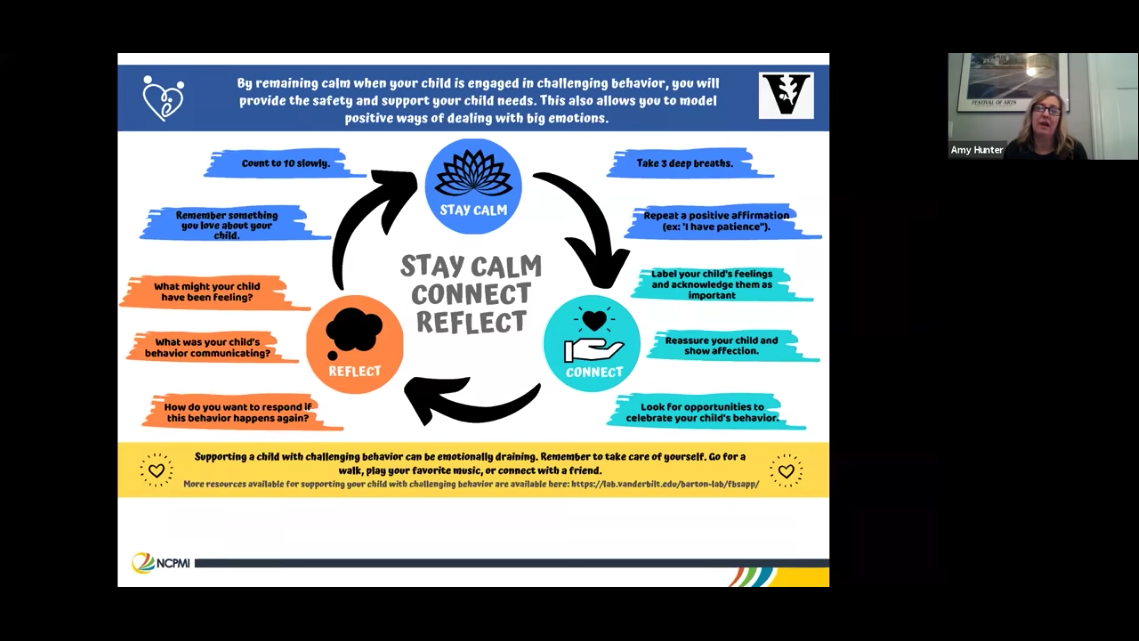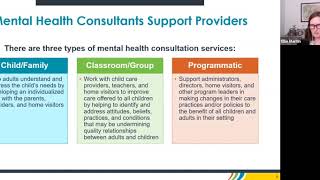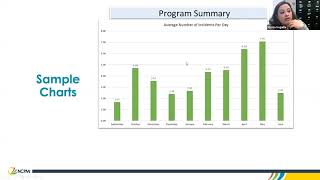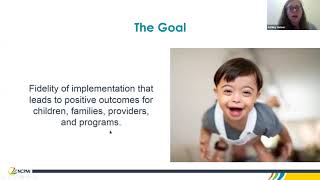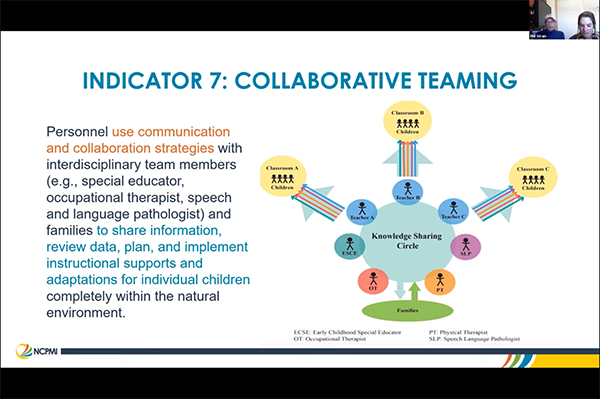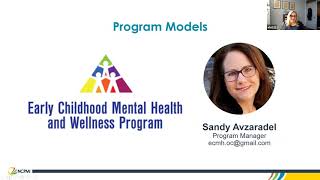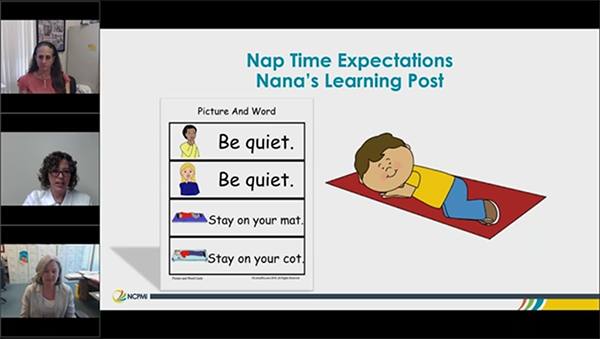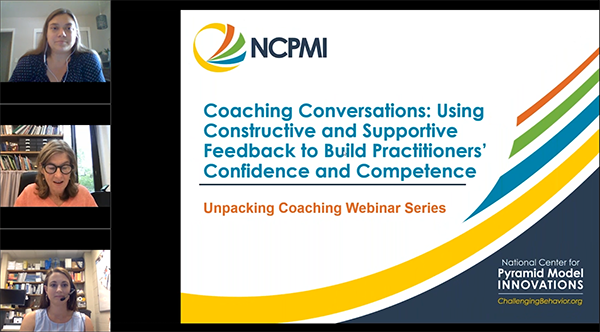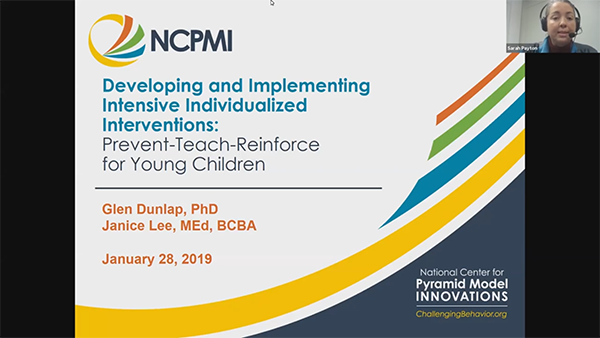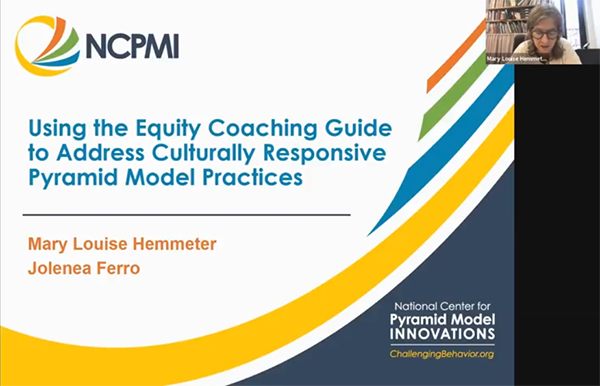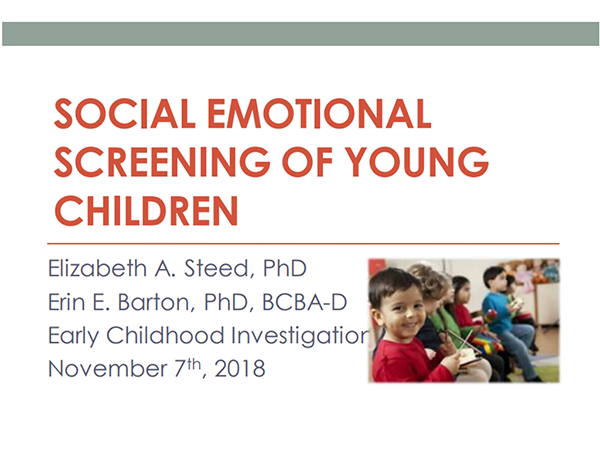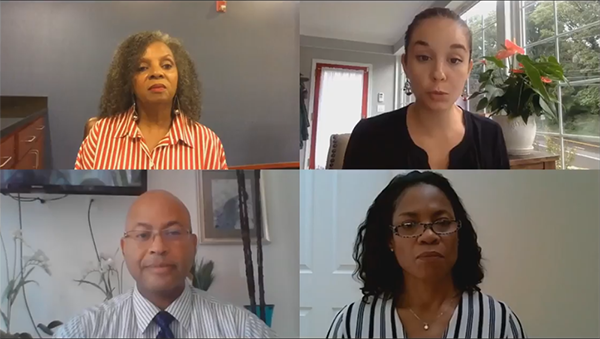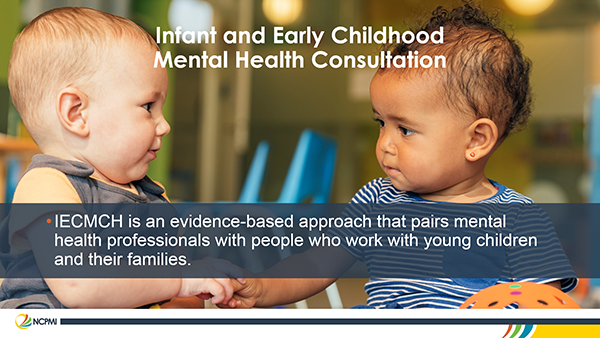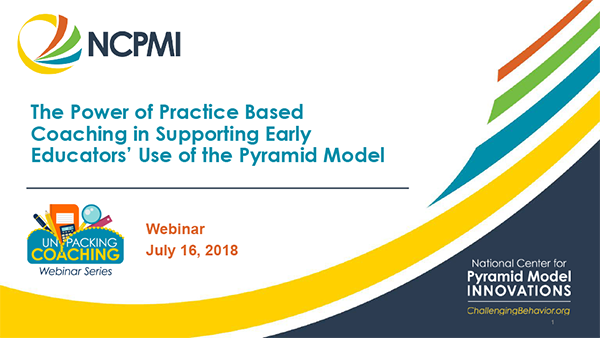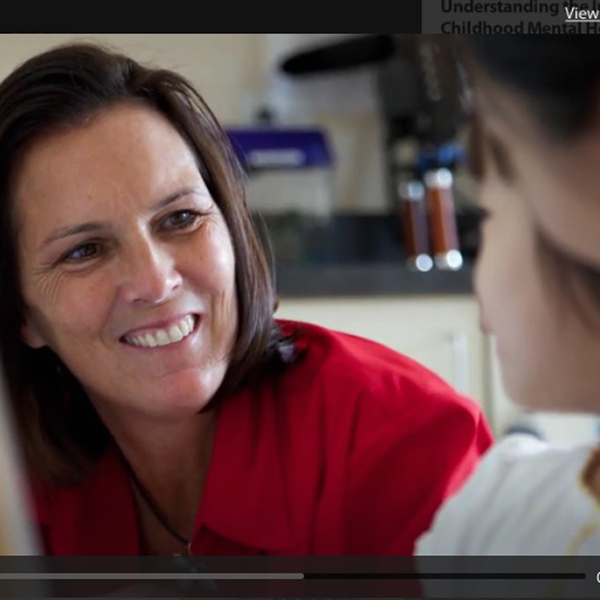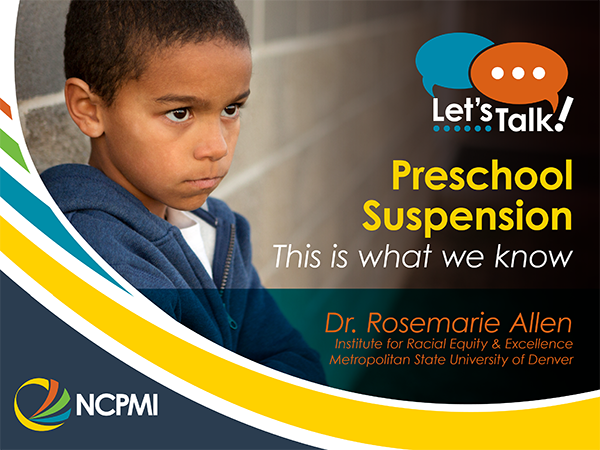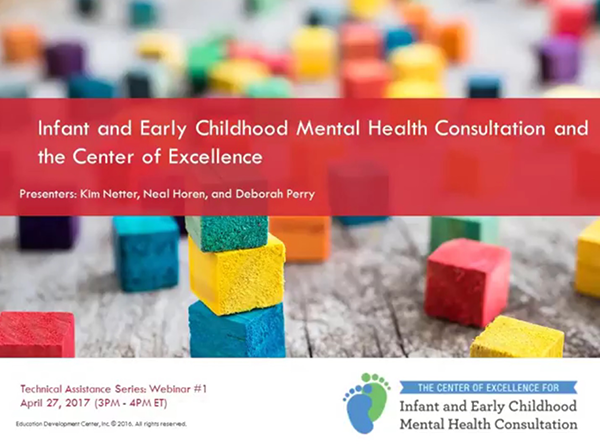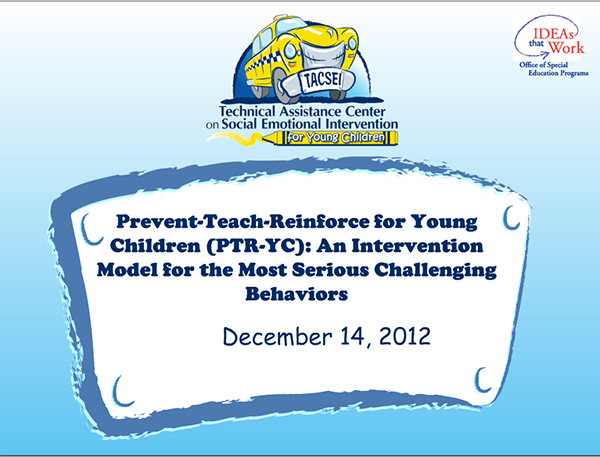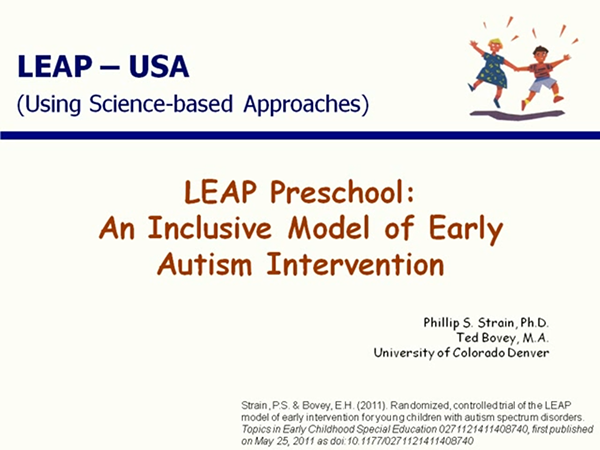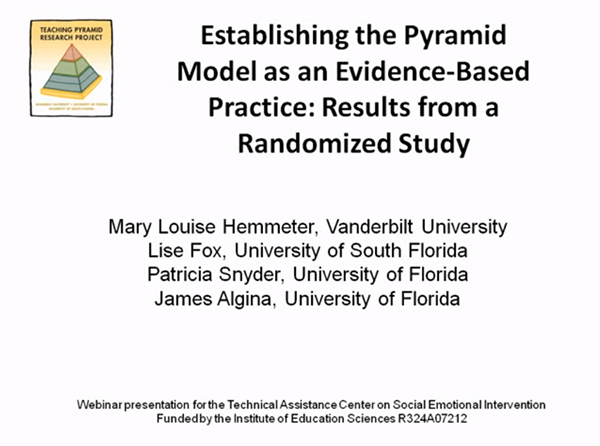FAQs
NCPMI webinars created after January 01, 2018 offer a certificate of attendance. Certificates are not available for older webinars at this time.
To receive the certificate of attendance, you must fill out the evaluation survey for that webinar. The URL link to the survey is displayed at the end of the webinar recording. You will need to pause the video so that you can read and type the URL into another browser window. Note: Type the URL exactly as you see it. The URL is CASE SENSITIVE.
Once you submit the survey, the certificate will appear. Save the certificate to your computer BEFORE you close the window. Once you close the window the certificate is gone.
For webinars that we post provided by other partner organizations, please contact those groups with questions.
In addition to its general webinars, NCPMI webinar are organized into four series:
- Digging into Data – Topics include data tools, data collection, analysis, and data-based decision-making.
- Let’s Talk! – Topics include race, equity, disproportionate discipline, and suspension/expulsion.
- Implementation and Scale-Up – Topics include best practices, implementation, inclusion, and family engagement.
- Unpacking Coaching – Includes topics relevent to program/practitioner coaching and practice-based-coaching.
- Within the Framework – Topics include best practices, implementation, inclusion, and family engagement.
To view all the webinars for a specific series, select the name of the series from the dropdown list in the ‘Category’ filter, below.
Webinar Archive
| Thumb | Title | Date | Webinar Series | Link | Content | Languages | hf:tags |
|---|---|---|---|---|---|---|---|
| Examining Essential PBC Resources to Maximize Coaching Outcomes | 03/27/2024 | Unpacking Coaching | View |
Does your coaching toolbox need a refresh? Join us as we walk through key coaching resources to help you organize and use your coaching tools with intention. We will show you where to locate each resource and how to use them to enhance your efficiency as a coach. We will highlight resources that have been recently updated. By the end of this webinar, you will be able to know how to use each resource, and use coaching data to make decisions to maximize your coaching efforts. | English | coaching-practitioner unpacking-coaching-webinar-series | |
| Implementing the Pyramid Model in Programs Supporting Indigenous and Alaskan Native Children and their Families | 01/12/2024 | Implementation and Scale-Up | View |
Is the Pyramid Model a framework that can be used in programs serving indigenous children and their families? What changes need to be made to ensure a fit with the culture of tribes and families served by those programs? Join us for a discussion from two programs, Cook Inlet Native Head Start in Alaska and Zaasijiwan Head Start in Wisconsin, to learn more about their Pyramid Model implementation and outcomes. | English | building-relationships-with-families equity family-engagement implementation-and-scale-up-webinar-series | |
| Writing a Scale-up and Sustainability Plan for Statewide Pyramid Model Implementation | 12/13/2023 | Implementation and Scale-Up | View |
This original online workshop was 3 hours in length including 3 small group breakouts of 30 minutes each. The recording of the workshop has been edited to be 1 hour in length and can be used with the related resources as a guided workshop for individuals or groups involved in the statewide implementation of the Pyramid Model. A Participants Workbook is provided that includes, agenda, objectives, links to all resources, slides and small group directions. The objective of this workshop for State Leadership Team members is to support the development of a written scale-up and sustainability plan for statewide implementation of the Pyramid Model addressing all four essential structures:
The recording is 60 minutes with agenda items for small group work sessions for additional time allotments. The first 45 minutes of the recording gives context and rationale for sustaining and scaling the Pyramid Model as well as provides descriptions of the National Center for Pyramid Model Innovations (NCPMI) tools and resources related to statewide scale-up and sustainability and a related guided small group break out session. The second 15 minutes describes more resources including a worksheet for developing a sustainability and scale up plan [ link to the worksheet] and provides for 2 small group breakout sessions for practice with and discussion of each tool and resource. With 3 30-45 minute small group breakouts, the workshop is about 3 hours long. Small group breakouts could be longer. | English | implementation-and-scale-up-webinar-series statewide-implementation | |
| A Conversation About Developing and Implementing Individualized Interventions for Children who have Experienced Trauma | 11/13/2023 | Within the Framework | View |
Join us for another conversation dedicated to implementing the individualized intensive intervention process while honoring the unique experiences of children who have experienced trauma. We will build on the March 2023 webinar to discuss the approaches teams might use as they engage in functional behavior assessment, plan development, and plan implementation to support a child who has experienced trauma. | English | behavior-intervention early-childhood-mental-health-consultation within-the-framework-webinar-series | |
| Coaching Conversations: Motivational Interviewing as a Strategy to Prompt Reflection and Practice Change | 11/01/2023 | Unpacking Coaching | View |
As a coach do you ever feel stuck? Do you ever wonder how your conversations might help facilitate increased practice change? Do you ever consider how you might be able to get more buy-in from practitioners for Pyramid implementation? Changing practice can be hard. Practitioners are mostly likely to change their practice when changes align with their own values and goals. Motivational interviewing can support practitioners to reflect on their own values and goals. These strategies can also support practitioners to reflect on their ambivalence about practice change. This webinar explores strategies such as asking open ended questions, validating, offering affirmations, reflective listening, and evoking practitioners’ ideas about change. | English | coaching coaching-practitioner unpacking-coaching-webinar-series | |
| Managing Coaching When Work Feels Unmanageable | 08/23/2023 | Unpacking Coaching | View |
DescriptionThe pandemic magnified weaknesses in early childhood settings that we are still trying to figure out. Programs report feeling overwhelmed with staff turnover, an uptick in reported challenging behavior, and an increase in the need to support staff wellness. With all of this going on, coaching sometimes gets put on the backburner. But what if there was a way to reimagine how we can keep coaching to build staff capacity despite these challenges? Join our webinar to hear reflections and solutions from coaches who have coached staff in kindergarten, childcare, and early intervention settings as they share their experiences navigating coaching when everything else feels unpredictable. Attending the Live EventIf you registered for the live event and your plans change, please update your registration status so that others may have a chance to attend. Viewing the RecordingAren’t able to attend the live webinar? A recording of the webinar will be made available, right here on this page, within 2 business days after the event. | English | coaching unpacking-coaching-webinar-series | |
| Insights from the Field: Implementing Pyramid Model Community-Wide | 07/20/2023 | Implementation and Scale-Up | View |
This webinar shares two states’ journeys on implementing and scaling up Pyramid Model Community-Wide efforts. Each state shares their unique experiences on how they got started with Community-Wide, lessons learned, tools they use, successes they are seeing in the communities, and the collaboration efforts with the state early childhood systems. | English | community-implementation implementation-and-scale-up-webinar-series statewide-implementation | |
| Coaching is Crucial: Supporting Teams with Individualized Behavior Support Plans | 05/03/2023 | Unpacking Coaching | View |
This webinar focuses on how to support teams to effectively implement an individualized behavior support plan. Viewers will hear strategies and ideas from coaches, teachers, and families about their experiences with the Tier 3 process. Strategies and ideas will be shared. | English | behavior-intervention coaching coaching-practitioner unpacking-coaching-webinar-series | |
| A Conversation About Integrating Trauma Informed Care in the Functional Behavior Assessment and Behavior Support Plan Process | 03/17/2023 | Within the Framework | View |
DescriptionYoung children are particularly vulnerable to the impact of traumatic experiences. In fact, traumatic experience can alter young childrens’ brain development. Young children who have experienced trauma may demonstrate a variety of emotional, behavioral and/or physical responses. Their responses to their experience depends on a variety of factors including: the nature, frequency, and intensity of the traumatic event(s); the child’s temperament, age, and development; the child’s previous experiences and the support the child and family receive. Trauma is a factor that must be considered as we develop behavior interventions and supports for young children. Join this webinar for a discussion on how trauma might be conceptualized, considered, and integrated into the functional behavioral assessment and individualized behavior support process. | English | behavior-intervention early-childhood-mental-health-consultation within-the-framework-webinar-series | |
| Help and Hope: Combining PBS and Optimism Training for Parents of Young Children with Challenging Behavior | 10/05/2022 | Within the Framework | View |
DescriptionHave you encountered families who feel that there is no hope to change their child’s behavior? The reduction in negative thinking and interpretation of events by parents has been documented as influencing parent behavior change, including enhanced implementation fidelity of behavior support strategies, resulting in improved child and family outcomes. Learn about the Positive Family Intervention research project and the cognitive behavior skill training procedures, also known as optimism training, that were utilized to teach parents how to identify situations prompting negative self-talk, specific beliefs that create barriers to intervention, the consequences of these beliefs, and the practice of using disputation and substitution. An application of optimism training will be shared that demonstrates how the reduction of parent pessimism helped to promote parent confidence, improved parent and child efficacy, and influenced the successful delivery and fidelity of PBS interventions for their child at home. Future considerations of adapting optimism training for use within collaborative teams to foster increased teacher confidence, persistence, and implementation fidelity of behavior supports for young children in school settings will also be proposed for discussion. | English | behavior-intervention family-engagement within-the-framework-webinar-series | |
| Inclusive Routines in Early Care and Learning: Inclusive Routines (Session 3) | 09/30/2022 | Within the Framework | View |
Part 3 of a 3-part webinar series titled Inclusion Benefits Everyone (Children, Families, Providers, and Directors) DescriptionIn the final webinar of this three part series, participants will explore how directors and administrators can support inclusion through responsive and joyful leadership. Directors will describe how inclusion is built across time through exploring culture; setting an inclusive mission, vision, and goals; having important conversations; and ensuring providers and teams have the professional development supports they want and need. Session 1: Inclusive Routines in Early Care and Learning Environments Session 2: Inclusive Routines in Early Care and Learning Collaborative Teams | English | classroom-implementation inclusion within-the-framework-webinar-series | |
| Inclusive Routines in Early Care and Learning: Collaborative Teams (Session 2) | 09/23/2022 | Within the Framework | View |
Part 2 of a 3-part webinar series titled Inclusion Benefits Everyone (Children, Families, Providers, and Directors) DescriptionIn this second of three webinars, we will explore how early care and learning providers and programs can use environmental routines to engage in coaching and collaborative teaming. Participants will learn how teams can use inclusive routines to benefit children’s development, to promote provider competence and confidence in using inclusive practices, and to positively impact workplace culture. Session 1: Inclusive Routines in Early Care and Learning Environments Session 3: Inclusive Routines in Early Care and Learning Inclusive Routines | English | classroom-implementation within-the-framework-webinar-series | |
| One Size Doesn’t Fit All: Using the Tiered Coaching Model for Practitioners | 09/21/2022 | Unpacking Coaching | View |
DescriptionThis webinar will focus on strategies and tools for implementing the Tiered Coaching Model (TCM), an innovative, data-driven coaching framework for supporting teachers in implementing evidence-based practices (EBPs) in their early childhood education (ECE) classrooms. TCM is designed to provide Practice-Based Coaching supports that are responsive to individual teachers’ preferences and needs. Participants will learn about each of the components of the TCM, and a panel of expert coaches will share their insights and perspectives on using the model to support teachers in implementing Pyramid Model practices in their classrooms. | English | coaching coaching-practitioner unpacking-coaching-webinar-series | |
| Inclusive Routines in Early Care and Learning: Environments (Session 1) | 09/16/2022 | Within the Framework | View |
Part 1 of a 3-part webinar series titled Inclusion Benefits Everyone (Children, Families, Providers, and Directors) DescriptionJoin us as we explore how routines can be used as the foundation for including young children with and without disabilities in early care and learning environments. In this first of three webinars, we will discuss how to design daily routines to implement inclusive practices in diverse care settings for children. Participants will learn how to use routines to support predictability and to create opportunities for young children to learn and meaningfully engage in naturally occurring environmental routines. Session 2: Inclusive Routines in Early Care and Learning Collaborative Teams | English | classroom-implementation within-the-framework-webinar-series | |
| Analyzing Program-Wide Pyramid Model Implementation: Introduction to the Teaching Pyramid Observation Tool (TPOT) and Teaching Pyramid Infant Toddler Observation Scale (TPITOS) | 08/23/2022 | Digging into Data | View |
A critical part to monitoring implementation of the Pyramid Model Framework is reviewing and action-planning around classroom implementation data. The Teaching Pyramid Observation Tool (TPOT) and Teaching Pyramid Infant Toddler Observation Scale (TPITOS)provides practitioner coaches concrete information as to how teachers are implementing Pyramid practices in the classroom. After collecting this information coaches, with teachers can build personal action plans that meet the needs of the teacher and their specific classroom. The measure outlines the critical elements of Pyramid Model implementation, and it allows the coach and practitioner to discuss and plan for implementation of each level of the Pyramid. In this webinar, participants will learn about the features of the these fidelity measures, review instructions for administration, and discuss possible actions gleamed from the data. | English | data digging-into-data-webinar-series program-wide-implementation | |
| Reflections from the Field: Positive Solutions for Families | 08/17/2022 | Within the Framework | View |
When young children exhibit persistent challenging behavior, there are impacts to daily routines and activities that affect the quality of life for the child as well as the child’s family, teachers, classmates and other peers. This webinar will provide an introduction to how we can understand a child’s challenging behavior in regards to its form and function. Discussion and examples will be used to explain the importance of gathering functional data/information to establish a sensible and effective path to behavior support. | English | family-engagement within-the-framework-webinar-series | |
| Peer Coaching in Early Childhood Classrooms | 06/15/2022 | Unpacking Coaching | View |
This webinar provides participants with a process for setting up and implementing a reciprocal peer coaching model in early childhood classrooms. Data evaluating the effectiveness of the reciprocal peer coaching model will be discussed briefly. The presenter will then walk participants through a three-step system for using peer coaching in early childhood classrooms: 1) planning, 2) implementing, and 3) monitoring. Participants will be provided with a peer coaching protocol and examples of data sheets. During the session, participants will have the opportunity to practice conducting a brief peer coaching session. | English | coaching coaching-practitioner unpacking-coaching-webinar-series | |
| Understanding Challenging Behavior: The Path to Behavior Support | 05/18/2022 | Within the Framework | View |
When young children exhibit persistent challenging behavior, there are impacts to daily routines and activities that affect the quality of life for the child as well as the child’s family, teachers, classmates and other peers. This webinar will provide an introduction to how we can understand a child’s challenging behavior in regards to its form and function. Discussion and examples will be used to explain the importance of gathering functional data/information to establish a sensible and effective path to behavior support. If you registered for the live event and your plans change, please update your registration status so that others may have a chance to attend. | English | behavior-intervention within-the-framework-webinar-series | |
| Understanding Trauma Informed Care and the Pyramid Model: Supporting Resilience in Early Intervention | 05/04/2022 | Within the Framework | View |
Childhood trauma may be more common than you think. Roughly 26 percent of children in the United States have witnessed or experienced a trauma before the age of 4 (Briggs-Gowan et al. 2010). It is highly likely that each provider in Early Intervention has worked with children and their families who have experienced trauma. Providers may not be aware of what a child has experienced, nor how the experiences impact the child and family. Join this webinar to hear more about trauma informed care, the Pyramid Model, and how these approaches support resilience for all children in early intervention, including those who have experienced trauma. This webinar will highlight the experiences of two Early Intervention programs, and will share resources you can use in your own programs. Learning Objectives:Participants will:
| English | early-intervention early-childhood-mental-health-consultation within-the-framework-webinar-series | |
| For State Leaders, By State Leaders: Meaningful Data Use for State Leadership Teams: Guidance for Cultivating Growth of the Data and Evaluation Essential Structure | 03/08/2022 | Within the Framework | View |
Many state leaders use the evidence-based Pyramid Model framework as an approach to build social and emotional competence in early care and education programs. Wisdom gleaned by state leaders to systematically implement, scale up and sustain their Pyramid Model efforts are being highlighted in this webinar series. Each webinar includes lessons learned and resources related to specific aspects of statewide implementation. We welcome champions of this work to join, share, and learn with us. | English | data equity statewide-implementation within-the-framework-webinar-series | |
| Analyzing Program-Wide Pyramid Model Implementation: Introduction to the Classroom Coaching Log | 03/03/2022 | Digging into Data | View |
Are you implementing the Pyramid Model in your program or are you just getting started? Data are an important part of Pyramid Model implementation and data decision-making. This webinar will provide an in-depth review of the Classroom Coaching Log and how data from the log can be used to help coaches better understand successful coaching supports and how strategies might be changed to improve teacher practices. | English | data digging-into-data-webinar-series program-wide-implementation | |
| For State Leaders, By State Leaders: Scaling and Sustaining Funding Through Policy Development | 02/24/2022 | Within the Framework | View |
This webinar will focus on implementing, scaling and sustaining the Pyramid Model in states through the development of fiscal policy. A framework for a policy development process and types of public policy specific to funding will be shared. Panelists from states will share their success stories in the leverage of fiscal policy supporting the scaling and sustainability of the Pyramid Model. | English | statewide-implementation within-the-framework-webinar-series | |
| Group Coaching to Support Pyramid Model Implementation: A Virtual Tour of Materials | 02/23/2022 | Unpacking Coaching | View |
This webinar will highlight the newly released group coaching materials available through the National Center for Pyramid Innovations. Presenters will provide a virtual tour of the package. Materials are included for 8 group coaching meetings for practitioners to learn about: social-emotional teaching practices, planning to implement a practice, sharing video, reflection, and providing feedback to peers on their use of the practices. Presenters will review the structure and sequence of the group coaching meetings and provide helpful tips for getting organized with the group coaching materials. | English | coaching coaching-practitioner group-coaching unpacking-coaching-webinar-series | |
| For State Leaders, By State Leaders: State Leadership Team Equity Inventory | 01/27/2022 | Within the Framework | View |
Many state leaders use the evidence-based Pyramid Model framework as an approach to build social and emotional competence in early care and education programs. Wisdom gleaned by state leaders to systematically implement, scale up and sustain their Pyramid Model efforts are being highlighted in this webinar series. Each webinar includes lessons learned and resources related to specific aspects of statewide implementation. We welcome champions of this work to join, share, and learn with us. | English | equity statewide-implementation within-the-framework-webinar-series | |
| Addressing Challenging Behaviors in the Classroom (in person or virtual) as a United Team | 12/15/2021 | Unpacking Coaching | View |
Coaching teachers to use universal Pyramid Model practices can have a positive impact on both teachers’ and young children’s daily experiences in early childhood classrooms. What if there are children in the classroom who need a little more help to follow routines, understand expectations, regulate their emotions, or connect to their peers? Join our panelists as they discuss their experiences and processes for working with teachers to individualize Pyramid Model practices in their classrooms. | English | behavior-intervention coaching coaching-practitioner unpacking-coaching-webinar-series | |
| Understanding Trauma Informed Care and the Pyramid Model: Supporting Resilience | 12/09/2021 | Within the Framework | View |
Childhood trauma may be more common than you think. Roughly 26 percent of children in the United States witness or experience a trauma before the age of 4 (Briggs-Gowan et al. 2010). It is highly likely that there are children who have experienced trauma in every early childhood classroom. Often early educators are not aware of what children have experienced in their early lives. Join this webinar to hear more about trauma informed care, the Pyramid Model and how these approaches support resilience for all children including those who have experienced trauma. This webinar will highlight how two early childhood programs use the Pyramid and trauma informed care to support children in their care. This webinar will also share resources you can use in your own programs. | English | behavior-intervention early-childhood-mental-health-consultation within-the-framework-webinar-series | |
| Analyzing Program-Wide Pyramid Model Implementation: Introduction to the Benchmarks of Quality | 12/02/2021 | Digging into Data | View |
Are you implementing the Pyramid Model in your program or are you just getting started? Data are an important part of Pyramid Model implementation and data decision-making. This webinar will focus on the why, what, when and how of collecting and using data in your program. Presenters will discuss systems and structures programs should consider and provide resources to make sure you can make the most of the data you collect. | English | data digging-into-data-webinar-series program-wide-implementation | |
| For State Leaders, By State Leaders: Implementing, Scaling and Sustaining the Pyramid Model Statewide with Fidelity | 11/30/2021 | Within the Framework | View |
This webinar will focus on implementing, scaling and sustaining high fidelity Pyramid Model statewide. Panelists from three states will share their experiences and resources they use to address State Leadership Team structure and membership, policy decisions, strategies for funding, and supporting high fidelity implementation of the Pyramid Model. | English | statewide-implementation within-the-framework-webinar-series | |
| Making the Most of Your Pyramid Model Data | 10/21/2021 | Digging into Data | View |
Are you implementing the Pyramid Model in your program or are you just getting started? Data are an important part of Pyramid Model implementation and data decision-making. This webinar will focus on the why, what, when and how of collecting and using data in your program. Presenters will discuss systems and structures programs should consider and provide resources to make sure you can make the most of the data you collect. | English | data digging-into-data-webinar-series | |
| Guiding Providers in Supporting the Social-Emotional Needs of Young Children During the Pandemic and Other Traumatic Events | 09/29/2021 | Within the Framework | View |
Join us for a discussion to learn about how early childhood education and care programs are being guided to use Pyramid Model practices in addressing the needs of young children during the Pandemic and other Traumatic Events. Our panel will discuss the impact of trauma on young children’s social-emotional health and how Child Care Resource & Referral leaders are making a difference in the support of programs. | English | emergency early-childhood-mental-health-consultation within-the-framework-webinar-series | |
| Coaching Conversations: Sharing the Teacher’s Perspective | 09/08/2021 | Unpacking Coaching | View |
In this webinar, ML Hemmeter will lead a discussion with a panel of teachers who have been coached using the Practice-Based Coaching framework. Join us as they share their perspectives implementing the Pyramid Model in early childhood settings and insights on how coaching supported their teaching practice. | English | coaching coaching-practitioner unpacking-coaching-webinar-series | |
| Coaching Conversations: Supporting Teachers to Implement Pyramid Model Practices Equitably | 06/09/2021 | Unpacking Coaching | View |
Coaches work collaboratively with teachers to support them in implementing Pyramid Model practices. Pyramid Model practices are designed to support young children’s development of social-emotional competence including emotional literacy, problem-solving, communicate their wants and needs, and peer relationship skills and to decrease the likelihood they will engage in challenging behavior. How do coaches support teachers to ensure they are using Pyramid Model practices to address the individual needs of each and every child in their classroom? In this webinar, panelists will discuss ways coaches can support teachers to implement Pyramid Model practices equitably. | English | coaching coaching-practitioner equity unpacking-coaching-webinar-series | |
| Critical Considerations for the Return to School for Young Children | 05/20/2021 | Within the Framework | View |
Join NCPMI leaders Lise Fox and Mary Louise Hemmeter for a discussion about what practices should be implemented to support children as they return to the classroom. The presenters will identify the priority social-emotional teaching practices for the preschool classroom, the use of Pyramid Model practices to support children entering kindergarten, and partnerships with families. | English | emergency within-the-framework-webinar-series | |
| Providing Supports to Classrooms and Children Using the Behavior Incident Report System (BIRS) | 05/06/2021 | Digging into Data | View |
This webinar will review how the Behavior Incident Report System (BIRS) can be used as a coaching tool to support classroom practitioners and children. Case studies will be presented that will be help coaches understand and reflect on how the BIRS can be a powerful tool to use to improve child outcomes. | English | coaching-practitioner data digging-into-data-webinar-series | |
| Using Practice-Based Coaching in a Group Coaching Format | 04/28/2021 | Unpacking Coaching | View |
Practice Based Coaching (PBC) can be delivered in a variety of ways to build teachers’ capacity to implement Pyramid Model practices in their classroom. In past webinars, we discussed how PBC is delivered individually. In this webinar, we invite a coach with experience using PBC in a group format. Panelists will discuss the benefits, the structure and process, and share teacher perspectives to using this approach. | English | coaching coaching-practitioner group-coaching unpacking-coaching-webinar-series | |
| Experiencing Inclusion Through Pyramid Model: New Resources from NCPMI | 03/19/2021 | Within the Framework | View |
The Pyramid Model for Promoting Social Emotional Competence in Infants and Young Children is designed to promote the inclusion of children with disabilities within community programs. In states where there is a focus on increasing the use of high-quality inclusion practices, the implementation and scale-up of the Pyramid Model offers an effective approach. Join us for a webinar featuring new products and resources focused on increasing the use of inclusive practices in Pyramid Model programs to better support children diagnosed with disabilities or needing individualized supports. Learn about important research, statewide implementation potential, and an assessment used to support inclusive practices in the classroom. | English | inclusion within-the-framework-webinar-series | |
| Using the Behavior Incident Report System: I have an Equity Alert. Now What? | 02/05/2021 | Digging into Data | View |
The Behavior Incident Report System (BIRS) Excel spreadsheet has the capacity to alert early childhood programs of possible disproportionality for various groups of children and a particular factor or outcome (i.e., behavior incident frequency, suspension, expulsion). This webinar will discuss the BIRS Excel spreadsheet’s built-in equity alerts, what the measures of disproportionality mean, and how a leadership team will review them. We will also present resources programs can use in their work towards equity. | English | data digging-into-data-webinar-series equity | |
| Using PBC to Coach Early Interventionists | 12/09/2020 | Unpacking Coaching | View |
Practice-Based Coaching (PBC) is an evidence-based coaching approach that supports practitioners to use effective teaching practices to promote positive child outcomes. PBC can be implemented in a variety of settings, including classrooms and center-based programs, family childcare homes, and early intervention and home-based programs. This webinar will outline the components of PBC and describe how to use PBC to coach early interventionists who are working with families in homes. The panelists will focus on using PBC to coach early interventionists to support families in enhancing their child’s social emotional competence. Panelists will share their experiences using PBC to coach early interventionists. | English | coaching coaching-practitioner early-intervention unpacking-coaching-webinar-series | |
| Digging Deeper into Inclusion in Colorado: National Implications for the Utility of Indicator Six and Quality Improvement | 12/04/2020 | Within the Framework | View |
While Colorado as a state has the highest Indicator 6 data in the country, the Preschool Team at the Colorado Department of Education sought to more deeply understand the quality of inclusive practices being implemented in publicly funded preschool classrooms across the state. This webinar will describe a study that was conducted to gather information from special educators and related service providers on how inclusive practices are implemented in programs and inform barriers to inclusion at the local policy and procedural level. Results of this study will be shared along with next steps the state will take to move forward to improve the dosage and quality of inclusive practices delivered to children. | English | inclusion statewide-implementation within-the-framework-webinar-series | |
| Partnering with Success: Stories from Early Childhood Professionals and Family Engagement | 12/01/2020 | Within the Framework | View |
Today more than ever there is a need to reach out and make positive connections with the families who we work with. In this webinar, you will hear from three panelists and their voices from the perspective of an inclusion early childhood special education classroom teacher, a program coach, and a mental health specialist. Each of the panelist will share successful tips and strategies for engaging and connecting with families in-person and virtually. | English | building-relationships-with-families family-engagement within-the-framework-webinar-series | |
| Data Decision-Making Using the BIRS | 11/16/2020 | Digging into Data | View |
You are using the BIRS and have data; now what? This webinar will go through the data decision-making process using the Behavior Incident Report System Data-Based Decision-Making Guide. Participants will learn about where to start with their analysis and how to drill down within the system to arrive at an actionable precision statement. | English | data digging-into-data-webinar-series | |
| Coaching in a Virtual World | 11/04/2020 | Unpacking Coaching | View |
Over the past few months, coaches and coachees have needed to adapt their coaching delivery and social-emotional teaching practices to a virtual format. Some of these practices are easier to adapt than others, leaving coaches and coaches wondering what to do. This webinar discusses how Pyramid Model practices can be used in virtual learning and strategies for implementing coaching of teachers virtually including how to conduct observations and collect information on coachees’ practices. | English | coaching coaching-practitioner emergency unpacking-coaching-webinar-series | |
| Bringing Inclusion to Life in a Virtual World | 09/30/2020 | None | View |
Shifts in the need for flexible service delivery require professionals to think carefully on the methods used to provide services that still meet FAPE, LRE, and Data requirements. Inclusive practices an be used regardless of instructional modality because of their operationalized nature. This webinar highlights the Early Care and Education Environmental Indicators which can be used to identify practices and provides examples of the elements for online, hybrid, and in-person settings. | English | emergency inclusion | |
| Addressing BIRS Implementation Challenges | 09/24/2020 | Digging into Data | View |
Are you using the BIRS or are you planning to use it and have questions about the Excel spreadsheet, the form, or how to begin using it in your program? This webinar will go through some of the common issues programs face when implementing the BIRS and address your questions. | English | data digging-into-data-webinar-series | |
| Coaching With Intention: Making the Most of the PBC Cycle | 09/16/2020 | Unpacking Coaching | View |
When using PBC, coaches use strategies to build collaborative partnerships with coachees, conduct focused observations, guide reflection and provide feedback to guide coachees in meeting their professional goals. For coaching to work, there are specific evidence-based practices coaches use. In addition, coaches must learn to provide different levels of support based on individual coachees’ needs. Fidelity, or the ability to use these evidence-based coaching practices the way they are meant to be used, is essential to delivering coaching effectively. For coaching to be effective, it must be delivered with fidelity. In this webinar, panelists will discuss the tools you can use to ensure you are using PBC with fidelity. | English | coaching coaching-practitioner unpacking-coaching-webinar-series | |
| Put Your Own Mask on First: Being a Great Pyramid Model Implementer in the Time of COVID-19 | 07/15/2020 | Within the Framework | View |
This presentation will focus on specific steps that early care and education administrators and practitioners can and need to take right no to ensure a functional preschool setting during this pandemic. Specific examples from the Pyramid Model will be highlighted. | English | emergency within-the-framework-webinar-series | |
| Addressing Challenging Behavior through Data: Implementing the BIRS in an Early Childhood Program | 07/14/2020 | Digging into Data | View |
The Behavior Incident Report System (BIRS) provides early care and education programs with a system to collect and analyze behavior incidents across the program. The system provides an efficient mechanism for gathering information on key elements related to behavior incidents that can be used to make decisions about providing supports to teachers and children. In this webinar we will help participants understand what they need to do to get started using the BIRS in their program. | English | behavior-intervention data digging-into-data-webinar-series | |
| Finding Executive Function in Your Pyramid Model Classroom: The Secret Ingredient You Didn’t Know You Had | 06/25/2020 | Within the Framework | View |
This webinar teaches about how early educators can foster the growth of social-emotional development through the unique lens of executive skill development. The presentation will describe how classroom teachers can a) facilitate the trajectory of executive skills relevant to social-emotional development, b) influence the practices of families of young children to better develop social-emotionally specific executive skills, and c) better shape the success of children after their transition to kindergarten by intentionally equipping them with these necessary skills. | English | classroom-implementation within-the-framework-webinar-series | |
| Re-Imagining Inclusion: High-Quality Inclusion for Young Children with Disabilities When the World Turns Upside Down | 06/24/2020 | None | View |
Sometimes community or world events will impact the work with have with children. This webinar offers strategies for having courageous conversations with stakeholders, provides examples of methods for partnering with families and strategies for special educators to provide distance learning experiences that will enrich social interactions for children without lowering our expectations of inclusion and safety. | English | emergency inclusion | |
| Creating Anti-Racist Early Childhood Spaces | 06/12/2020 | Let's Talk | View |
Now, more than ever it is important to address issues of race and bias in early childhood settings. Children notice race at a very early age and can begin to categorize people according to skin color. This webinar presents strategies for creating an anti-racist environment to promote the development of healthy racial identities. | English | equity lets-talk-webinar-series | |
| Delivering Coaching from A Distance | 06/11/2020 | Unpacking Coaching | View |
Distance coaching has been an option to address challenges in finding time and opportunities to meet. These challenges are especially evident in family childcare and rural settings. Due to our country’s recent events, many coaches are finding ways to do their coaching from a distance. We discuss distance coaching as one way to address this issue. We also discuss the successes and challenges of distance coaching through our panelists’ experiences, and how program leadership teams and coaches can implement specific supports to make distance coaching successful. | English | coaching coaching-practitioner program-implementation-coaching unpacking-coaching-webinar-series | |
| Addressing Challenging Behavior through Data: Introduction to the BIRS | 05/22/2020 | Digging into Data | View |
The Behavior Incident Report System (BIRS) provides early care and education programs and classrooms with a system to collect and analyze behavior incidents in their program. The system provides an efficient mechanism for gathering information on elements related to behavior incidents that can be used to make decisions about providing supports to teachers and children within the program. In this webinar, participants learn about the Behavior Incident Report system and get a tab-by-tab review of the Excel spreadsheet and the types of analyses it offers. | English | behavior-intervention data digging-into-data-webinar-series | |
| Providing Distance Family Support: What Do I Say? How Can I Help? A Conversation with NCPMI Faculty | 04/17/2020 | Within the Framework | View |
Are you providing early intervention or preschool services using distance technology? Do you have questions about how you can support families as they help their children with learning activities or conducting intervention within routines? NCPMI faculty share ideas on checking in with families, how to respond to difficult questions, and resources that might be shared. | English | building-relationships-with-families emergency family-engagement | |
| All Hands on Deck: Defining the Role of Mental Health Consultation and Supports Within the Coaching Context | 04/01/2020 | Unpacking Coaching | View |
Infant and Early Childhood Mental Health Consultation (IECMHC) is emerging as an evidence-based intervention for supporting young children’s social and emotional development and addressing challenging behaviors. IECMHC aims to improve the ability of staff, families, programs, and systems to prevent, identify, treat and reduce the impact of mental health problems among children from birth to age 6 and their families. IECMHC occurs within the context of a collaborative relationship between a consultant with mental health expertise and early care and education provider, and/or a family member (Cohen & Kaufmann, 2000). In this webinar, we explain the relationship and role between IECMH consultants and Pyramid Model coaches. We also discuss how coaches can identify when they might need the support of a mental health consultant, and how to locate resources when the staff, families, or children they are working with require access to mental health supports. | English | coaching early-childhood-mental-health-consultation infant-toddler unpacking-coaching-webinar-series | |
| Using the Behavior Incident Report System (BIRS) to Support Practitioners Around Children Who Engage in Challenging Behavior | 12/11/2019 | Unpacking Coaching | View |
Often times coaches are faced with issues of gaining trust and buy-in from practitioners who feel overwhelmed with implementing new skills due to behaviors in the classroom they find challenging. The Behavior Incident Report System (BIRS) was developed by the National Center for Pyramid Model Innovations, and can be used as a coaching tool at the classroom level to support practitioners in understanding the behavior that is occurring in their classroom (e.g frequency, behavior type, motivation and responses to the behavior). This webinar reviews the BIRS, and how it can be used as an effective coaching tool to support practitioners in individual classrooms. Discussions address supports that might be helpful for coaches to use when helping practitioners reflect on the types of supports already present in the classroom, and what may need to be implemented. | English | behavior-intervention coaching coaching-practitioner data unpacking-coaching-webinar-series | |
| Program-Wide Implementation of Pyramid Model Practices in Early Intervention/Part C | 12/05/2019 | Within the Framework | View |
The National Center for Pyramid Model Innovations has developed a framework, practices and tools to support implementation of the Pyramid Model by Part C, Early Intervention programs. This webinar describes the framework, critical elements, practices, and fidelity tools that can be used to support program-wide implementation and early interventionists’ practices. The program-wide implementation framework and critical elements were designed to be implemented within the multiple types of service delivery models used across Early Intervention Programs and states. The early interventionists’ practices are focused on building families’ confidence and competence in supporting their child’s social emotional development. This webinar may be helpful for Part C state leaders, program leaders, and early interventionists to identify which program wide elements are already in place, which Pyramid Model practices their staff are already using well, and next steps for their programs or individual goals. | English | early-intervention program-wide-implementation within-the-framework-webinar-series | |
| A Day in the Life of a Practitioner Coach: Planning for Coaching Caseloads | 11/20/2019 | Unpacking Coaching | View |
The beginning of the school year is a busy time for programs, practitioners and coaches alike. Coaches may feel overwhelmed by balancing their time getting to know their coachees, preparing for visits, travel, observing, creating materials, or planning for debriefing meetings. It might be difficult to know where to start. In this webinar, panelists will share practical strategies for planning and managing time around coaching caseloads. | English | coaching coaching-practitioner unpacking-coaching-webinar-series | |
| What Works in Reducing Suspensions and Disproportionality: The Pyramid Model | 11/18/2019 | Let's Talk | View |
Panelists will share their experiences as a Pyramid Equity Program (PEP) site, discussing what worked, challenges and overall success in implementing the Pyramid Model, with a specific focus on addressing equity. They will share their experiences using equity tools such as the Behavior Incident Reporting System (BIRS) and the Pyramid Model Coaching Equity Guide. | English | equity lets-talk-webinar-series suspension-expulsion | |
| Indicators of High-Quality Inclusion: A Comprehensive Set of Tools | 10/15/2019 | Within the Framework | View |
This webinar is designed to provide an overview of the National Early Childhood Inclusion Indicators Initiative, a joint project by NCPMI and Early Childhood Technical Assistance (ECTA) Center. The suite of materials—developed for states, local programs and child environments—intended to increase the implementation of high quality inclusive practices will be presented. Specific attention will be paid to the early childhood education environment (ECEE) inclusion indicators. Video examples will be used to illustrate implementation of the ECEE inclusion indicators in a variety of programs as well as implications for local program and state level staff. | English | inclusion within-the-framework-webinar-series | |
| All Hands on Deck: Integrating Infant Early Childhood Mental Health Consultation and the Pyramid Model | 10/07/2019 | Within the Framework | View |
Infant and Early Childhood Mental Health Consultation (IECMHC) is an evidence-based approach that pairs mental health professionals with people who work with young children and their families. Professionals who provide IECMHC can be critical partners in the implementation of the Pyramid Model. Join this webinar panel discussion to learn about two different IECMHC models and how each model incorporates the Pyramid Model in their work. The webinar panelists discuss the relationship between mental health consultation and the Pyramid Model highlighting how these distinct approaches align and supplement one another. | English | early-childhood-mental-health-consultation infant-toddler within-the-framework-webinar-series | |
| The Pyramid Model Goes to Family Child Care Homes | 08/19/2019 | Within the Framework | View |
Join us for a discussion about the implementation of the Pyramid Model in family child care homes. The panelists describe how Pyramid Model practices are used in family child care homes, discuss how they coach and support family child care providers, and share examples of the use of Pyramid practices by family child care providers. | English | family-child-care-home within-the-framework-webinar-series | |
| Coaching Conversations: Using Constructive and Supportive Feedback to Build Practitioners’ Confidence and Competence | 07/10/2019 | Unpacking Coaching | View |
Practitioner coaches often feel most comfortable providing supportive feedback to practitioners. However, coaches are sometimes left wondering how to provide effective constructive feedback, while still maintaining positive partnerships and buy-in from practitioners. This webinar highlights how the reflection and feedback component of Practice-Based Coaching occurs within the context of collaborative partnerships. Panelists discuss how to prepare for reflection and feedback with practitioners, and share tips and strategies for providing supportive and constructive feedback, and reflective questioning techniques. | English | coaching unpacking-coaching-webinar-series | |
| Early Childhood Suspensions: The Impact on Families | 03/27/2019 | Let's Talk | View |
When a child is suspended from school, it not only impacts the child, but the entire family. Parents often feel isolated and ashamed. They may also feel defeated with nowhere to turn. Many parents worry about the impact of the suspension on the child’s future, losing their job to care for the child during the suspension period, their child being targeted, and their child’s ability develop and maintain positive relationships with teachers and peers. During this webinar, parents share the impact of their child’s suspension(s) on the family. | English | equity lets-talk-webinar-series suspension-expulsion | |
| Making Coaching Come Alive: Creating Action Plans to Promote Practitioner Buy-In | 03/20/2019 | Unpacking Coaching | View |
This webinar unpacks the action planning component of the PBC cycle. Presenters discuss identifying an action plan goal, the components of an effective action plan, and the coach practitioner collaborative relationship during the action planning process. | English | coaching coaching-practitioner unpacking-coaching-webinar-series | |
| Developing and Implementing Intensive Individualized Interventions: Prevent-Teach-Reinforce for Young Children | 01/28/2019 | Within the Framework | View |
This webinar provides an introduction to Prevent-Teach-Reinforce for Young Children (PTR-YC). PTR-YC is an evidence-based model that classroom teams can use to resolve patterns of serious challenging behavior. PTR-YC is a user-friendly model of positive behavior support that is intended to help young children whose challenging behaviors are compromising their social, emotional and intellectual development. The webinar offers a description of the background and procedures of PTR-YC along with a case study to illustrate the PTR-YC process. | English | behavior-intervention within-the-framework-webinar-series | |
| Using the Equity Coaching Guide to Address Culturally Responsive Practices | 11/07/2018 | Unpacking Coaching | View |
This webinar provides an overview of the Pyramid Model Equity Coaching Guide, and how it can be used as a coaching tool to support culturally responsive practice in the classroom and with families. Presenters define culturally responsive practice, identify equity issues in the context of coaching, and share examples of opportunities of when and how to use the guide to support coaching work. This discussion is followed up with a short Q&A session. | English | coaching coaching-practitioner equity unpacking-coaching-webinar-series | |
| Social-Emotional Screening of Young Children: Early Identification is Essential to Healthy SEL | 11/07/2018 | Select a choice....' | View |  In this webinar, assessment and intervention experts, Erin Barton, PhD and Elizabeth Steed, PhD, describe the purpose of social-emotional screening of young children in the context of promoting social-emotional development and identifying children at risk for social-emotional difficulties. This webinar provides an overview of specific social-emotional screening tools and how one might pick a tool for their program’s use. The presenters use a case study to illustrate how to implement one of the most widely used tools, ASQ:SE-2, and make decisions about next steps for children at risk for social-emotional challenges.
| Arabic | data early-intervention infant-toddler | |
| Having Conversations about Race, Bias, and Equity | 09/25/2018 | Let's Talk | View |
This webinar will focus on race and implicit bias in in early childhood programs. Participants will discuss the impact of racial bias on teaching, learning, perceptions of behaviors, and decision making in early childhood environments. | English | equity lets-talk-webinar-series suspension-expulsion | |
| All Hands on Deck: Partnering with Infant and Early Childhood Mental Health Consultants to Implement the Pyramid Model | 09/11/2018 | Within the Framework | View |
Infant and Early Childhood Mental Health Consultation (IECMHC) is an evidence-based approach that pairs mental health professionals with people who work with young children and their families. Professionals who provide IECMHC can be critical partners in the implementation of the Pyramid Model within early childhood education and care programs including assisting programs with concerns such as trauma, crisis in communities, staff wellness, and connections with community services. The webinar panel will discuss the relationship between the mental health consultant and the Pyramid Model leadership team and the supports that might be provided by the mental health consultant to build the capacity of the program and personnel as they provide services to young children and their families. | English | early-childhood-mental-health-consultation within-the-framework-webinar-series | |
| The Power of Practice-Based Coaching in Supporting Early Educators’ Use of the Pyramid Model | 07/16/2018 | Unpacking Coaching | View |
Part of the Unpacking Coaching webinar series, this webinar provides an overview of practice-based coaching (PBC) and how it can be used to support implementation of the Pyramid Model practices. Practice-Based Coaching is briefly introduced and then three panelists who have been involved in coaching related to the Pyramid Model share their experiences. | English | coaching coaching-practitioner unpacking-coaching-webinar-series | |
| Mental Health Consultation Tool | 07/16/2018 | Select a choice....' | View |
The Infant and Early Childhood Mental Health Consultation (IECMHC) learning module highlights the role of the IECMHC. The interactive module is divided into lessons with realistic scenarios and short video clips. Each lesson has its own resource area designed to provide extensive support around IECMHC. Revisit it as needed to gain a better understanding of your role as a Head Start IECMHC. | English | early-childhood-mental-health-consultation | |
| Let’s Talk! Preschool Suspensions: This is What We Know | 03/23/2018 | Let's Talk | View |
The “Let’s Talk” webinar series, hosted by Dr. Rosemarie Allen, provides panel discussions related to equity, inappropriate discipline practices, and effective strategies. This session will discuss preschool suspensions. | English | equity lets-talk-webinar-series suspension-expulsion | |
| Infant Early Childhood Mental Health Consultation (IECMCH) and the Center of Excellence | 04/27/2017 | None | View |
Watch this webinar recorded on 4/27/17 to learn more about Infant Early Childhood Mental Health Consultation and the Center of Excellence. This video defines IECMHC, outlines its history, importance and impact, delineates the key messages, and highlights the work of the Center of Excellence. | English | early-childhood-mental-health-consultation | |
| A Day in the Life of an Infant and Early Childhood Mental Health Consultant | 08/17/2016 | None | View |
An IECMH Consultant supports the skills and strengths of program leaders, staff, families, and children during a typical day in a classroom setting. Explore other resources about IECMHC at www.samhsa.gov/iecmhc. | English | early-childhood-mental-health-consultation | |
| Prevent-Teach-Reinforce for Young Children: An Intervention Model for the Most Serious Challenging Behaviors | 12/14/2012 | None | View |
This webinar provides a description of Prevent-Teach-Reinforce for Young Children, a model of intervention for young children with the most persistent and severe challenging behaviors. The model is based on the well-established procedures of positive behavior support, but is designed to help providers implement the assessment and intervention strategies with a high level of fidelity, leading to improved effectiveness. PTR-YC is a process for use in early childhood care and education settings, including pre-K classrooms, and consists of teaming and goal setting, practical data collection, functional behavioral assessment, intervention planning and implementation. All steps are designed for use by typical early childhood providers. | English | behavior-intervention | |
| LEAP Preschool: An Inclusive Model of Early Autism Intervention | 06/01/2012 | None | View |
In this webinar, Phil Strain and Ted Bovey introduce you to the LEAP Preschool Model, an inclusive, evidence-based model for young children with autism that was founded in 1981. The webinar begins with an overview of key model Ted Bovey components, follows with a discussion of several key research findings from over 30 years of research on the intervention strategies used and outcomes for children in the program and then wraps up by highlighting some of the key lessons learned about preschool inclusion for young children with autism. The LEAP Model parallels the levels of the Pyramid Model in many ways and similarities between LEAP and Pyramid implementation are briefly outlined. LEAP’s Quality Inclusion Curriculum (including the Peer Mediated Social Skills Curriculum and Parent Skills Training Curriculum) is available from Teacher’s Toolbox Publishing. Additional information about the LEAP Preschool Model is available from the Positive Early Learning Experiences (PELE). | English | inclusion | |
| Establishing the Pyramid Model as an Evidence-Based Practice: Results from a Randomized Study | 05/18/2012 | None | View |
In this webinar, Mary Louise Hemmeter and Lise Fox discuss a recently completed, randomized trial that examined the implementation of the Pyramid Model within public school preschool classrooms in Tennessee and Florida that included children with disabilities. They describe the research methods, training and supports provided to teachers, and the outcomes for teachers and children including children with challenging behavior. The discussion focuses on issues related to implementation fidelity, coaching, and measuring the outcomes associated with Pyramid Model implementation. | English | research |

